Feed aggregator
Tuesday Musings: What Makes An Effective Villain?
I love villains. I love writing them. I love reading them. I love seeing them brought to life on big screen and small.
Well, let me modify that. I love villains in fiction and movies and television shows. I can’t stand real-life villains. (In the interest of keeping things civil, I won’t name any of the real-life villains I have in mind, even the one whose name rhymes with Peon Husk.) But a good fictional villain can make even the most mundane of stories shine. And a boring or ineffective villain can ruin an otherwise effective narrative. Over the years, as a reader, teacher, and editor, I have seen many beginning writers undermine their stories by making the same mistakes in the development of their antagonists.
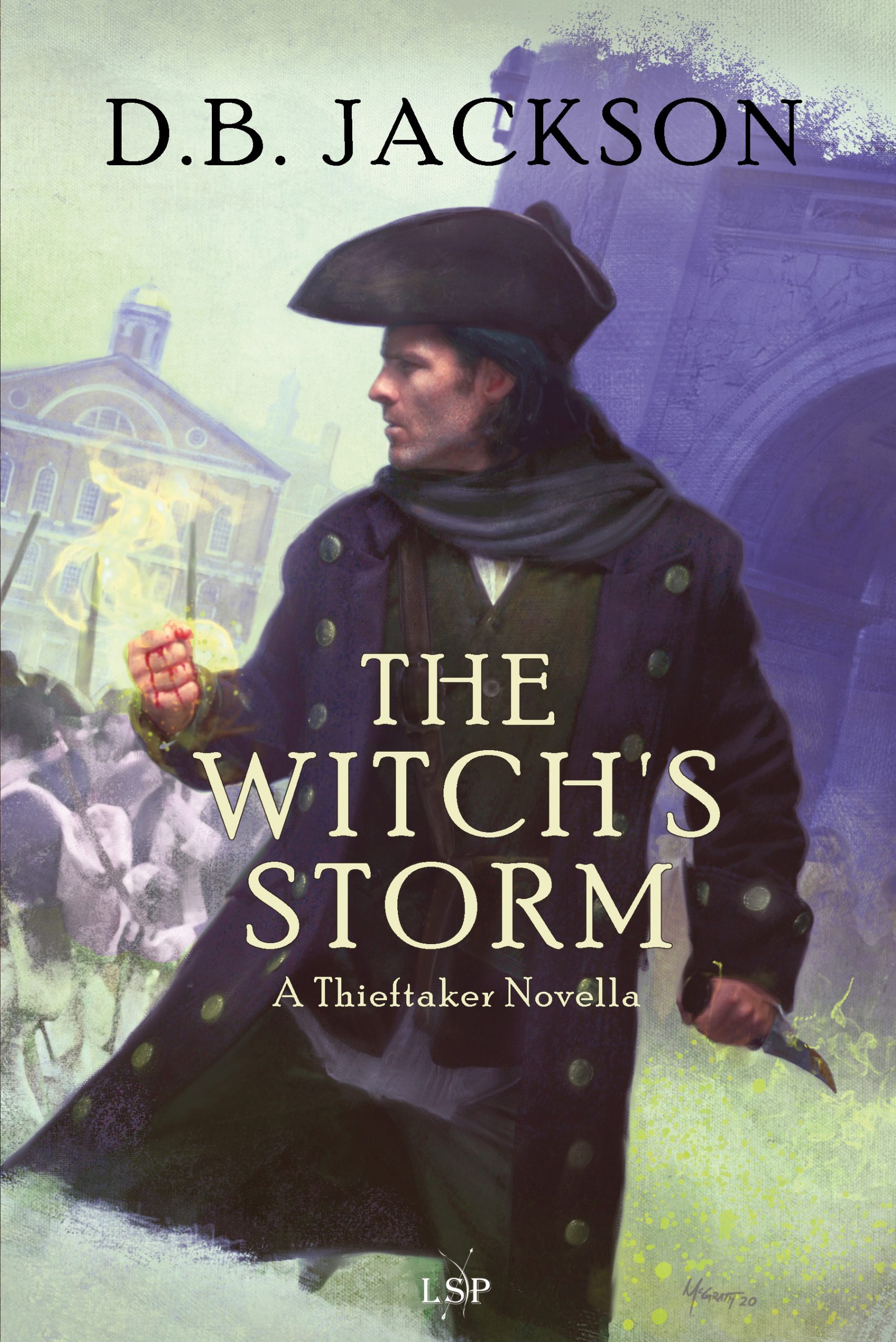 What qualities make a villain compelling? I intend to dive into that. Who are some of my favorite villains? I’ll get into that, too. But let me offer a few quick points up front. I don’t think much of the all-powerful-evil-through-and-through villains one often encounters in the fantasy genre. Sauron, for instance — the evil god whose world-conquering designs lie at the heart of J.R.R. Tolkien’s The Lord of the Rings — is, to my mind, a very boring villain. He’s really powerful, and he’s really, really evil. And yes, he’s cunning, which is a point in his favor, and he’s scary (or his minions are). But beyond that, and unless one has gone back and read all his backstory in The Silmarillion, there isn’t really much to him. He lacks dimension and complexity.
What qualities make a villain compelling? I intend to dive into that. Who are some of my favorite villains? I’ll get into that, too. But let me offer a few quick points up front. I don’t think much of the all-powerful-evil-through-and-through villains one often encounters in the fantasy genre. Sauron, for instance — the evil god whose world-conquering designs lie at the heart of J.R.R. Tolkien’s The Lord of the Rings — is, to my mind, a very boring villain. He’s really powerful, and he’s really, really evil. And yes, he’s cunning, which is a point in his favor, and he’s scary (or his minions are). But beyond that, and unless one has gone back and read all his backstory in The Silmarillion, there isn’t really much to him. He lacks dimension and complexity.
So, let’s begin there. In my opinion (and yes, ALL of this is just my opinion), villains should be complex. There should be more to them than mere evil. Their backstory should contain the seeds of their villainy and the twisting of their world-view. Because let’s face it, most of the villains we encounter and create do some pretty messed up things in pursuit of their agendas. They’re not all there sanity-wise. But how they wound up there ought to be an interesting tale in and of itself. And the fact that their actions are working at cross purposes with those of our protagonists should not mean they can’t have some normality and even joy in their lives. They can and should have people and things that they love. They should be relatable for our readers. One of my very favorite villains is Brandan of Ygrath, the emperor-sorcerer who is the villain of Guy Gavriel Kay’s Tigana. He is charming, brilliant, loving with those he cares about, handsome, refined. He is also ruthless, merciless, temperamental, and unpredictable. He does horrible, cruel, vicious things for reasons that are both understandable and insufficient. He is nearly as easy to like as he is easy to hate.
Too often, I see young authors make their villains unintelligent and unsubtle. They give their villains lots of power, but then undermine that power by making their machinations transparent. Villains, I believe, need to be canny, keen of mind, creative. Their schemes should be the stuff of genius. Remember the old Adam West Batman series? I used to watch it after school when I was little. Invariably, Batman’s foes would leave him in a situation where he wasn’t dead yet, but he would be soon. They were sure of it. So they didn’t need to wait around to make sure. They could leave, and eventually, the pendulum on the giant clock with the medieval axehead attached to it would cleave the masked crusader in two! And, of course, their premature departure gave Batman and the Boy Wonder the opportunity they needed to escape their less-than-certain deaths. Stupid villains were entertaining and convenient when we were kids watching bad TV. But for more sophisticated fiction, stupid villains will ruin a good tale.
Think of it this way: Assuming that our protagonist eventually manages to overcome the villain in our story, the power AND intelligence AND shrewdness of the bad guy reflect well on our good guy. The easier the villain is to defeat, the less challenging their plot against the world, the less impressive our hero appears when they prevail. When we build up our villain, when we make them really smart and really cunning, our hero’s victory becomes that much more of an achievement. Consider it narrative mathematics.
 Some of my favorite villains from my own work? Quinnel Orzili from the Islevale Cycle (Time’s Children, Time’s Demon, Time’s Assassin), Saorla from the second and third books in The Case Files of Justis Fearsson, and, my absolute favorite, Sephira Pryce from the Thieftaker books. Yes, she later become something other than a pure villain, but that was basically because she became SO much fun to write that I had to find a way to keep her around and relevant.
Some of my favorite villains from my own work? Quinnel Orzili from the Islevale Cycle (Time’s Children, Time’s Demon, Time’s Assassin), Saorla from the second and third books in The Case Files of Justis Fearsson, and, my absolute favorite, Sephira Pryce from the Thieftaker books. Yes, she later become something other than a pure villain, but that was basically because she became SO much fun to write that I had to find a way to keep her around and relevant.
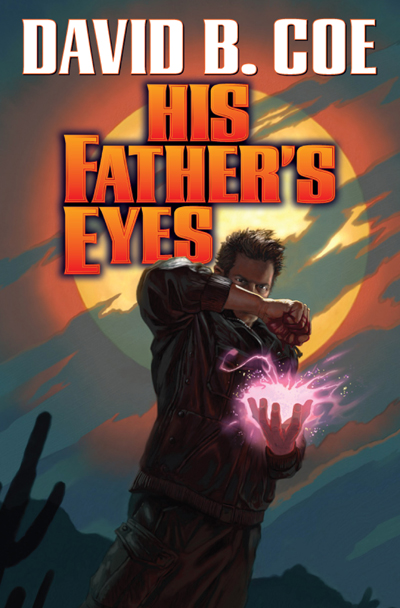 My favorite villains in the work of others? I already mentioned Brandan of Ygrath. John Rainbird, from Stephen King’s masterpiece, Firestarter, is a terrific villain. Smart, brutal, and yet also human. In Catie Murphy’s marvelous Negotiator trilogy there are two supernatural “bad guys,” Daisani and Janx, whose personal rivalry threatens the fabric of the mortal world. Their mutual animus and their own needs and desires humanize them and make them terrific foils for Magrit Knight, the series’ protagonist. And I would add that a certain writer I care not to mention in light of recent revelations has created some truly amazing villains. Too bad he wound up being a villain worthy of his own undeniable storytelling talents.
My favorite villains in the work of others? I already mentioned Brandan of Ygrath. John Rainbird, from Stephen King’s masterpiece, Firestarter, is a terrific villain. Smart, brutal, and yet also human. In Catie Murphy’s marvelous Negotiator trilogy there are two supernatural “bad guys,” Daisani and Janx, whose personal rivalry threatens the fabric of the mortal world. Their mutual animus and their own needs and desires humanize them and make them terrific foils for Magrit Knight, the series’ protagonist. And I would add that a certain writer I care not to mention in light of recent revelations has created some truly amazing villains. Too bad he wound up being a villain worthy of his own undeniable storytelling talents.
So, make your villains relatable, make them canny and dangerous and terrifying, and make their eventual defeat a true achievement for your protagonist. And try not to be villainous yourself.
Advice for this week. Cheers!!
Teaser Tuesdays - The Drowners
 Last night, I dreamt of a windowless room with pale green walls and blank clock faces without numbers. Where time had vanished, and no doors existed.
Last night, I dreamt of a windowless room with pale green walls and blank clock faces without numbers. Where time had vanished, and no doors existed.(First 2 sentences of The Drowners by David A. Anderson)This is an uncorrected ARC, so text and cover might be different on release: March 17, 2025.
---------
Teaser Tuesdays is a weekly bookish meme, previously hosted by MizB of Should Be Reading. Anyone can play along! Just do the following: - Grab your current read - Open to a random page - Share two (2) “teaser” sentences from somewhere on that page BE CAREFUL NOT TO INCLUDE SPOILERS! (make sure that what you share doesn’t give too much away! You don’t want to ruin the book for others!) - Share the title & author, too, so that other TT participants can add the book to their TBR Lists if they like your teasers!
Snippet – The Counterfactual War (Conquistadors II)
Prologue I
From: The United States and the Protectorate War. Baen Historical Press. 2070.
It cannot be denied that the United States of the early thirties was a deeply divided society, in a world that was increasingly fragmented, hostile and/or fundamentally opposed to American values. The recent election had brought many of the tensions threatening American stability into the open and the victory of President Hamlin, a well-meaning and decent but ultimately ineffectual politician unwilling or unable to confront the problems facing the United States, did nothing to calm the roiling fury under the surface. Prone to dithering, lacking any real power base, it seemed likely his first term would be his last. Indeed, even his own party was preparing to primary him rather than take the risk of letting him seek re-election.
Political deadlock in Washington owed much, it should be acknowledged, to the simple fact the United States was not in any physical danger. Chaos along the Mexican border and turmoil in the Caribbean did not post any significant threat, certainly not one that threatened the political or bureaucratic elite in Washington. Simmering tensions in both the Ukraine and the South China Sea – and, of course, the Middle East – might draw attention briefly, only to be dismissed as the United States returned to contemplating its internal problems. Talk of civil war, never far from the surface, seemed to ebb and flow with the tides. The paralysis in Washington seemed to ebb and flow with the tides.
It was the worst possible time for the United States to face an Outside Context problem, an invasion from another world. But there was no choice.
The Protectorate knew nothing of America’s problems when they transposed their assault force into our dimension. Through sheer luck, the Protectorate Expeditionary Force arrived right on top of a small town in Texas – Flint – and rapidly secured the area, while probing the surrounding region and hacking the internet to download as much data as possible. They had assumed theirs was the only timeline that had enjoyed an industrial revolution and it was a surprise to discover that our world was a technological civilisation, if one nearly a century behind their own. Their commander – Captain-General James Montrose – had no intention of retreating, let alone opening peaceful contact and developing diplomatic relationships. He had come to make his name through conquest and determined to do so. His brief attempts at diplomatic outreach were nothing more than a bid to buy time.
President Hamlin dithered, as was his wont. Flint was surrounded and sealed off by the United States Army, but there was no attempt to demand access to the occupied town or seek confirmation of the tale the diplomats had been told. Unsure of what he was dealing with, Hamlin ignored the advice of his Vice President – Felix Hernandez – and his military officials, refusing to countenance either a more aggressive approach or a pre-emptive strike. It was not until a refugee fleeing the town accidentally started a brief engagement that rapidly spiralled out of control that the military was permitted to take a harder line, too late. The PEF attacked with a fury and technological edge the defenders couldn’t match, rapidly overrunning the army positions and expanding into Texas. A combination of computer hacks and cruise missiles strikes further weakened the United States, making it difficult to coordinate any response.
On paper, the PEF was greatly outnumbered. In practice, their advanced technology and cold-blooded ruthlessness allowed them to crush resistance, eventually seizing Austin and threatening nearby states before America learnt how to fight them. The sheer force of their attack weakened both the United States and its global allies, while their diplomatic contacts with hostile states – and covert operations within America – raised the promise of reinforcements and even American surrender. Their ability to land almost anywhere – showing off their power by attacking New York – cowed Hamlin. Believing the war to be lost, with the arrival of a second invasion force in the Middle East, he made overtures to Montrose.
This was too much for Felix Hernandez and his growing cabal. They started making urgent preparations to remove President Hamlin from power, preparations that were ironically detected by the PEF and used to justify a strike into Washington itself. With only limited understanding of how the American government worked, the PEF moved to seize the White House and the President, intending to use him as a puppet. The plan misfired. The assault force found itself trapped in Washington, and the relief force was forced to fight its way through the city in a desperate and ultimately futile bid to save it. Casualties were heavy on both sides, including Hamlin himself, but the PAF suffered its first real defeat.
As Felix Hernandez took the Oath of Office, and James Montrose secured his position by scapegoating another officer, they both knew the war was far from over.
Prologue II: Timeline A (Protectorate Homeworld)
It was deeply frustrating, Protector Julianne Rigby reflected, that they couldn’t know what was happening on the far side of the dimensional wall.
The Triumvirs of the Protectorate had been reluctant to concede that they had to trust the men commanding the crosstime expeditionary forces. It put a great deal of power in the hands of men who were incredibly ambitious, who had been chosen for their ambition and determination, and there was always a risk of one or more commanders going rogue. There was no way around it – the researchers had yet to develop any sort of crosstime communications device that didn’t require a gate – and yet it was deeply frustrating. London had been able to direct operations around the globe and beyond, from the moment radio had been invented, and to find themselves out of touch with their commanders was galling. There was just no way to know what was going on.
Her lips thinned as she studied the image on her display. Captain-General James Montrose was tall, dark and handsome, handsome enough to make any woman feel a draw even if she was old enough to know better. He was a brilliant commanding officer, driven by a compulsive thirst for victory – and the rewards that came with it. Granting him command of a crosstime invasion force had always been a gamble, although there were limits on just how much power he could claim for himself before reinforcements arrived. The Protectorate was the only timeline that had mastered steam, let alone coal and oil and nuclear power. There was little he could do to build a power base for himself in a world where the most advanced device known to exist was a waterwheel …
Or so they had thought. Castle Treathwick had been rotated into Timeline F and a sizable chunk of the timeline had been rotated back into the Prime Timeline, including pieces of a town and a large number of inhabitants. They had been rounded up very quickly and interrogated – of course – and the town remnants had been hastily searched for anything useful, from books to maps and charts. They’d expected little, but they’d hit the motherlode. The town didn’t just have a public library, a rarity outside the Prime Timeline; it had computer databases and records and a great many other things that proved, beyond a shadow of a doubt, that Timeline F was a technological society. Their advancement appeared to have come in fits and starts – the sociologists were already producing theories to explain how the widespread degeneracy had retarded technological development – but there was no denying the Protectorate Expeditionary Force faced a foe far more capable than any before. Montrose’s orders for such a contingency had been vague, if only because no one had really thought it would ever happen, and he’d clearly taken full advantage of the latitude he’d been granted to launch a war. Julianne wasn’t surprised. A man as ambitious as Montrose wouldn’t back down unless he was confronted by an equal or greater force, and that was clearly lacking. Indeed, the second set of kidnapped locals – rotated into the Prime Timeline as the second invasion force was dispatched – had confirmed it. The war appeared to be going well.
Julianne felt her mood darken as she studied the political map. It looked absurd, putting the lie to the theory that technological advance would bring about planetary unity, but there was no denying it was real. Hundreds of nations, some with nuclear weapons; their world divided so completely it would be laughably easy to turn them against one another. The combination of superior military force and advanced technology would be quite enough, turning local nations into allies that would be discarded or subjected the moment they were no longer useful. And yet …
Her intercom bleeped. It was time.
Julianne keyed her console, then sat back in her chair as the other two Triumvirs flickered into existence in front of her. The holograms looked faintly wrong, as always, something that had always made her smile even though she understood the reasoning behind it. The Protectorate had more than enough computing power to fake almost any communication, with minibrains playing the role to near-perfection, and a transmission that looked too good to be true would be regarded with extreme suspicion until it was checked and cleared. The council had the finest experts in the known multiverse working for them, yet as technology advanced the technology to fool it advanced too. Julianne would have preferred to hold the meeting in person, but that wasn’t an option. The degenerates of Timeline F were a technological civilisation. The gap between them and their masters was wide, but not wide enough. Given time, they would develop their own crosstime capabilities. They already knew it was possible.
“Parliament is pleased,” Protector Horace Jarvis said, curtly. “That doesn’t bode well.”
“No,” Protector John Hotham said. “But is that a bad thing?”
Julianne shrugged. Jarvis had openly admitted he didn’t trust Montrose, while Hotham argued Montrose could be trusted to serve the Protectorate as well as himself. Julianne had been the deciding vote and it had been impossible to avoid acknowledging that Montrose was very much a two-edged sword. He could cut their enemies, but he could also turn on his masters. It had been a calculated risk, one that – in hindsight – might have been a mistake. Given control of a civilisation that could actually support his forces, Montrose could go rogue. He was certainly charismatic enough to convince many of his subordinates to follow him.
“The prize is worth some risks,” she mused. “If we gain control and open permanent gates …”
The vision unfolded in front of them. The Protectorate ruled four timelines, three populated by primitives and one apparently untouched by intelligent life. It was difficult to uplift the locals of the first three timelines, leaving them fit only for brute labour that could be carried out far more efficiently by machines. A population that actually understood science, and didn’t think aircraft were the chariots of the gods, was a population that could actually achieve something. All they needed was proper guidance, something the Protectorate was happy to provide. An influx of labour from Timeline F could turn the earlier timelines into genuinely productive parts of the empire. It would happen without them, of course, but not in her time.
“If,” Jarvis pointed out.
Hotham snorted. “They’re a hundred years behind us, at least! They pose no threat.”
“Montrose does not have unlimited manpower. Or industry.” Julianne knew why. “They could trade a hundred of their tanks for every one of his and still come out ahead.”
“And if Montrose wins, will he turn on us?” Jarvis leaned forward. “He’s already popular. He could declare himself a warlord, declare independence, if he secures the timeline before we can open permanent gates.”
Julianne kept her face expressionless as Hotham started to splutter. The hell of it was that Jarvis had a point. Montrose’s exploits had been widely reported and even though the reports were incomplete – they could hardly be otherwise – they had made him a hero. The media was already telling the world about his glorious victories, no matter that there was no independent verification of anything they’d learnt from the second set of prisoners. Parliament had passed a vote of thanks, while ambitious politicians were lining up to praise Montrose and demand the government work faster to save Timeline F from itself. The reports of widespread degeneracy had shocked Parliament, not without reason. The analysts had recovered enough pornographic material from the captured computers to shock even hardened spooks. She shuddered to think what such exposure was going to their children.
“He’s not going to be happy working his way up the ladder, not after conquering a world,” Jarvis said. “Why would he step down?”
“He’s too loyal to go rogue,” Hotham insisted. “Julianne?”
“There are two problems,” Julianne said. “The first is that the war is not yet won. It is unlikely in the extreme that the United States of America” – an absurd concept, to one born in the Prime Timeline – “has surrendered. Montrose cannot have won. Not yet. We owe it to him to provide as much support as possible, even if we don’t entirely trust him.”
Hotham glowered. “And the second?”
Julianne braced herself. “Montrose could lose.”
“What?”
Julianne honestly couldn’t tell which of the men had spoken. Perhaps it had been both. The Protectorate hadn’t lost a battle in nearly a hundred years. There were few primal states capable of putting up even the slightest resistance, if the Protectorate decided to squash them, and none of the timelines they’d discovered earlier had enjoyed even the slightest concept of modern technology. The Protectorate had grown too used to its tradition of victory, to regarding war as a game and expansion as their natural right. The war games were as realistic as possible, pitting different units against their peers, but there were limits. It was difficult to imagine what it might be like to face a society that not only understood technology, yet could also mass-produce their own weapons and work to duplicate the Protectorate’s. It had never happened before.
And we don’t know how long it will take them to devise their own plasma cannons or antigravity systems, she thought. The researchers hadn’t been able to offer any sort of reassurance. There were too many unanswered questions for them to be sure of anything. How long will it take them to duplicate the Crosstime Transpositioner and reach our world?
“There is no way they can defeat us,” Hotham snapped. “Montrose can hold his position indefinitely.”
“We dare not assume so,” Julianne said, tartly. “The enemy has nukes. And ballistic missiles.”
“The Castles are capable of withstanding a nuke,” Hotham said.
“The degenerates only need to get lucky once,” Julianne said, keeping her voice calm. “We are committed to war now. We have no choice. We must support Montrose.”
“We’re already preparing the third invasion force,” Jarvis said. “The commander can be given orders to relieve Montrose.”
“For what?” Hotham’s face darkened. “What crime has he committed?”
“He arguably exceeded his orders,” Jarvis snapped.
“Arguably,” Hotham repeated. “Parliament will not agree.”
Julianne suspected he was right. Montrose had orders to be diplomatic – or to blow up Castle Treathwick – if he encountered an equal or superior civilisation. A primitive civilisation would pose no challenge, beyond a minor logistics headache. But one advanced enough to be useful without being advanced enough to be dangerous … Montrose had either been very brave or very stupid and no one would know for sure, not until the war was over. He might have done the right thing.
“We can convince Parliament,” Jarvis said.
“We cannot convince his supporters,” Hotham countered. “They’ll revolt.”
“And the last thing we need is a struggle for command authority in the middle of a war,” Julianne agreed. It wasn’t just Montrose. By long custom, a Captain-General had the right to nominate his subordinates, promising them a share in the new timeline in exchange for their service and support. Montrose hadn’t secured all of his choices, but he’d managed to get enough in place to ensure relieving him would be very tricky indeed. “If the enemy takes advantage of it …”
She let her voice trail off, suggestively. No previous opponent had been able to take advantage of command disunity. They’d lacked the insight to know when it was happening, or the ability to influence their betters. This group of degenerates might be … well, degenerates, yet that didn’t make them stupid. They might be as cunning as any primal, with the technology to make themselves really dangerous. The hell of it, she reflected, was that they’d probably been committed to war from the moment Castle Treathwick was rotated into the new timeline. The Protectorate needed neither competition nor subversion. And it would get both, if they failed to bring the new timeline under control.
The argument went on for hours, but the outcome was inevitable. The war would go on.
But in truth, Julianne reflected as the meeting finally came to an end, the matter was out of their hands. And had been so for months now.
Chapter One: Jubal, Texas, Timeline F (OTL)
This isn’t right, Sergeant Callam Boone thought, as he surveyed the deserted ruins of a once-proud town. This isn’t America.
He kept himself low, eyes sweeping the street as the small team lurked in the shadows. Jubal had been a prosperous town once, with a factory and a thriving population and everything they needed to support themselves, from a school to simple and affordable housing. It would have made an ideal retirement town, if the factory hadn’t shut down and plunged the town into a nightmare from which it had never recovered. The majority of the inhabitants had moved out, leaving a few stragglers mired in hopelessness and despair. It had been galling to watch the collapse of so many communities, to see people struggling with alcohol and drugs because they had little hope of ever bettering themselves; harder still to hear the lectures from snooty university lecturers, reporters, politicians and other rich and privileged men north of Richmond who had no idea what it was like to grow up in such a community and cared less. It was easy to see why so many of the remaining inhabitants had joined the enemy work gangs, even though it was technically treason. What had the United States done for them?
Callam spat as he leaned forward, bracing himself. It was dawn, the air light enough to see clearly without NVGs. The street was a wreck, a handful of burned-out cars and houses a grim reminder that the United States was in the grip of a military invasion from another world. The Protectorate – the Puritans, as they had come to be known – had swept through Jubal, blasting aside anyone who got in their way, and then abandoned the town after rounding up the population and moving them south. They had made all sorts of promises about cleaning up the local environment, but they’d done nothing to collect the garbage on the streets or repair the homes for human occupation. Callam felt a hint of shame as the wind picked up briefly, stirring the garbage on the streets. He’d seen such sights in Iraq during the war, but it felt wrong to see them in America. But it was just another sign of hopelessness. It ate people alive.
He glanced back at the rest of the team, then motioned them forward. The four men behind him looked like raiders rather than soldiers, carrying weapons that were surprisingly primitive compared to the high-tech array they’d deployed in Iraq and Afghanistan, but they had no choice. The Protectorate was good at tracking radio signals and any other sort of betraying emission, their visual sensors were better than anything America could deploy. He glanced up into the lightening sky, wondering if there was a drone up there watching them. It was difficult to spot an American UAV with the naked eye, even one large enough to pass for a manned aircraft, and the Protectorate drones were smaller and stealthier. He’d been told the techs were working on ways to detect them, but he’d believe it when he saw it. There was no guarantee they’d crack the puzzle in time to matter.
They advanced forward, skirting the houses and crossing a wrecked schoolhouse that could have passed for Springfield Elementary. A body lay on the ground in front of the gates, so badly decayed it was impossible to tell what had killed it. Callam gave the corpse a quick glance and moved on, wishing there was time to give the dead man a proper burial. Someone had painted a note on a faded sign – SCHOOL’S OUT FOREVER – and left it there, exposed to the elements. Callam felt a twinge of something he didn’t want to look at too closely. If the Protectorate won the war, school really would be out forever. Defeat meant the end of the world.
They reached their planned ambush point and slowed, sweeping the surrounding area for possible threats. There were none, the rotting homes seemingly abandoned. He glanced into one and scowled as he saw the handful of faded pictures on the walls, left behind years before the invasion had begun. A young boy growing from a toddler to a child to a teenager to a young adult … he wondered, suddenly, what had happened to the kid and his parents. They’d left their home and then … what? Why had they left in such a hurry?
He checked his watch, then unslung his rucksack and removed the electromagnetic trap. The device looked crude and cumbersome, as if it had been assembled by someone who didn’t quite know what he was doing, but he’d been assured it should work. Corporal Bulgier took the other half of the device out of his bag and emplaced it on the far side of the street, half-hidden by a garbage can. Callam tensed as he triggered the lasers, linking the two halves of the device together. He’d been told the system was undetectable, but it was hard to be sure. The Protectorate had surprised the defenders before and no doubt it would do so again.
“Get into place,” he hissed, just loudly enough to be heard. The ambush site wasn’t perfect, but what was in this day and age? He disliked having to rely on a plan with too many moving parts and he was painfully aware of just how much could go wrong, yet … he’d just have to hope for the best. “Keep your heads down as much as possible.”
“Yes, Granddad,” Corporal Bulgier hissed back.
Callam gave him a sharp look as he found a place to hide. He’d thought himself retired from war, when he’d left the Marine Corps to become the Sheriff of Flint, and if the Protectorate hadn’t invaded he knew it was unlikely he would ever see war again. He certainly hadn’t thought there would be a civil war, even though he’d seen the spreading hopelessness and despair and outright hatred of the federal government. The population was too beaten down to consider revolt, or working on building its own self-supporting networks and having as little to do with the government as possible. And then …
Guilt gnawed at his heart. It had been sheer luck he’d been far enough from Flint to escape, when the Protectorate arrived. Cold logic told him he’d done the right thing in running, in taking everything he’d seen to higher authority, but he didn’t believe it. He felt like a coward, running from danger even as darkness swept over the town that had elected him Sheriff. The folk back home were under the yoke now, a yoke that was oddly light in some ways and very harsh in others. Or so he’d been told. Reports from the occupied zone were vague and often contradictory. He suspected some were little more than enemy propaganda. The Protectorate had had no trouble finding allies, people willing to sell out their country for money, power, or even something as simple as medical care and enough food to fill their bellies. If they had come into the world blind, they knew what they were dealing with now.
And no matter how many times I fight now, he thought, it will never be enough.
His watch vibrated, once. Callam tensed. It was time. He peered forward, half-expecting to see a handful of enemy hovertanks rocketing towards him. The Protectorate could move with terrifying speed and it was certainly possible they’d want to nip any trouble in the bud, although it was unlikely they’d pegged his team as a major threat. Or indeed any kind of threat. Seventy miles to the east, a USMC formation was risking their lives to mount a diversionary attack, to draw the enemy’s attention away from him. The guilt grew stronger, a mocking reminder of his failure. He wouldn’t fail again.
A faint whining noise echoed on the air, sending unpleasant feelings through his body. He wasn’t entirely unaware of sonic weapons, but it was one thing to read about them and another to experience the effect in person. It was disconcerting, even worrying. The sound grew louder as he gritted his teeth, reminding himself he’d been through worse. And yet it made him want to be afraid.
It isn’t real, he told himself, sharply. It isn’t real!
The sound grew more unpleasant as the drone came into view, a tiny flying saucer about twice the size of a garbage can lid. It reminded him of a drone he’d seen during his last deployment, except it was smaller and radiated strobe lights that made it hard to see clearly. He’d thought the drone would be an easy target – he was a very good shot and his team included shooters who were even better – but the combination of lights and vibration made it hard to pick out the actual drone from the blurry haze. His head twanged painfully as a strobe light pulsed against his eyeballs, a grim reminder of just what longer exposure could do to him. If half the tales were true, a protest march in Austin had ended with the protestors comatose, vomiting, or otherwise incapable of offering resistance – or even running – before it was too late.
He looked down, watching as the drone came closer. It was hard to tell if it was being controlled remotely by a distant pilot or operating on some kind of AI, although he supposed it hardly mattered. The Protectorate used the drones to patrol the edge of its sphere of influence, making it clear that anyone who tried to cross no-man’s land did so at severe risk of their lives. Callam ground his teeth in silent frustration, bracing himself as the last few seconds ticked away …
A deafening shriek, almost human, split the air as the trap was sprung. The drone stopped dead, vibrating so violently Callam half-expected it to tear itself apart as it threw sparks in all directions, then crashed to the ground. He ducked down quickly, fearing the drone would carry a self-destruct charge, although he was already too close to be safe. The Protectorate didn’t have lawyers impeding military operations and while they didn’t set out to cause civilian casualties they didn’t let the fear of killing innocents get in their way either. They certainly wouldn’t let it stop them from fitting a self-destruct into their drones.
It hit the ground. Callam let out a breath as the whining sound and crazy lighting died away. He hadn’t felt so disconcerted since his first combat patrol, despite the best training the USMC could provide, but the effect was fading rapidly now. He forced himself to stand and hurry towards the drone, feeling an odd sense of unreality nagging at his mind. It felt like gazing upon a scorpion or a spider, an uneasy sense there was something fundamentally wrong about the thing in front of him. Up close, the drone was smaller than he’d thought, the disc studded with sensor arrays and devices that had no obvious function. They didn’t look like weapons. The damage was difficult to assess. A number of tiny arrays looked broken, but he didn’t know enough to tell if there was any internal damage.
Score one for the techs, he thought. They didn’t know how the drone flew – up close, there were no propellers or tiny jet intakes – but they had been sure they could bring the flying saucer crashing down. Whatever they did, it worked.
“Get the body bag,” he snapped. “Hurry!”
“Here,” Corporal Hastings said. The lone woman in the group, she moved with practiced ease to open the black bag and hold it ready. “Hurry!”
Callam nodded. It was oddly hard to touch the drone – it felt like reaching out to pick up a spider, the sensation refusing to abate even as his fingers touched cooling metal – but he forced himself to lift the drone and shove it into the bag. The techs had assured him that the material was designed to block everything from radio to a handful of electromagnetic radiations he’d never even heard of, ensuring the Protectorate couldn’t track their missing drone and throw a missile at it from a safe distance, yet it was impossible to be sure. Six months ago, alternate timelines had been nothing more than bad science-fiction, with evil goatee-wearing counterparts tormenting the main characters before being booted back to their own dimension. Now …
His lips twitched. Do I have a counterpart in their world? One with a goatee?
Callam shoved his empty rucksack to Corporal Hastings, then slung the body bag over his shoulders and stood. He’d expected the drone to be heavier, but it was only lightly more weighty than the dustbin lid it so resembled. He supposed it wasn’t really a surprise. The Marine Corps had been working hard to lighten everything for easier deployment, in hopes of ensuring a major force could get halfway around the world before some local tyrant decided to cause too much trouble, and the Protectorate clearly felt the same way. The rest of the team was already bugging out, as planned. It felt wrong – the Corps did not leave men behind – but there was no choice. The enemy might already be on the way.
He unhooked a grenade from his belt and held it at the ready as he walked away, then removed the pin and tossed it at the crash site. It was unlikely any investigators would believe the drone destroyed beyond all hope of recognition, not if they sifted through the crash site, but it was just possible any distant observers would think the drone had exploded. It might buy a few seconds more as they picked up speed, hurrying towards the extraction point. They didn’t dare risk bringing vehicles too close to the region, not when they’d make easy targets for enemy air power. They had to put some distance between themselves and the enemy before it was too late.
This is America, he thought, with a hot flash of anger. It isn’t right!
Corporal Hastings slowed as the sound of distant gunfire echoed through the air. Callam motioned for her to pick up the pace, even though the air was growing warmer by the second. They were too far from the diversionary attack to hear anything – he thought – but it was impossible to be sure of that too. The shooting could be anything from a local offensive to resistance insurgents or drug or people smugglers taking advantage of the chaos to ply their deadly trade. Or men who thought they were the last free Americans in the world. The army had stumbled across a half-hidden ranch of people who thought the Protectorate had overrun the entire country, if not the entire world. It had been surprisingly hard to convince them that the world had not ended. Not yet.
He cursed under his breath as he heard a distant whine, his ears twitching unpleasantly as he picked up speed. The enemy might have been diverted or they might not … it didn’t matter. He forced himself to keep going, heading towards the extraction point as the rest of the team hurried elsewhere. They would probably be ignored, he told himself, as he felt sweat prickling down his back. Better they got clear before it was too late.
“Crap,” Corporal Hastings muttered.
Callam glanced back. Two more drones were gliding towards them, moving with terrifying speed. They could have blasted both Americans if they’d wanted … that meant the drones, or their controllers, wanted to take prisoners. Callam wasn’t reassured. The Protectorate was more civilised than many of America’s other foes, but no one had any doubt that any captives would be interrogated and they would be forced to talk. There was certainly no reason to think the Protectorate was be any different. They probably had some super-advanced lie detectors and truth drugs to ensure that whatever they were told was actually true.
He gritted his teeth. “Run!”
The whining grew louder as they ran, the drones getting alarmingly close. He had no idea what they had to capture prisoners – his imagination suggested everything from netting to phasers on stun – but they were running out of time. The noise was making his ears ache, reaching into his brain and making it hard to think … he nearly stumbled, his sense of balance suddenly twisting to the point he almost fell. His muscles jittered painfully, threatening to cramp … it was hard to keep going. He hadn’t felt so sore since his first weeks at Camp Pendleton. He’d thought himself in good shape and yet …
He heard a shout and threw himself to the ground as the RPG team fired, nearly at point-blank range. The RPGs were primitive compared to Javelins and other modern antitank missiles, but that wasn’t a disadvantage against an enemy capable of countering and neutralising most modern weapons. The warheads were touchy too, detonating near the drones even if they didn’t score direct hits. He turned his head just in time to see the drones crashing to the ground.
“Got them, Sarge,” Private Singh snapped.
“Set the charges, then get moving,” Callam ordered. He’d hoped the RPG team would be able to avoid contact and withdraw without being noticed, let alone engaged. They had taken a calculated risk in leading the drones to the team … he told himself, sharply, that they’d done what they had to in order to secure their prize. The drone they’d captured might prove the key to defeating the Protectorate. Might. “We don’t have much time.”
He glanced south, feeling cold despite the heat. Everything looked normal and yet, only a few miles away, American territory was in the iron grip of a crosstime invasion. Six months ago, it would have been unthinkable. The idea was absurd. He snorted as they set the charges and hurried off, leaving them to detonate. The idea of a military invasion of the United States had been inconceivable, after the Civil War.
But a great deal had changed since then.
Book review: Death of the Author by Nnedi Okorafor

ABOUT THE AUTHOR: Nnedi Okorafor’s books include Lagoon (a British Science Fiction Association Award finalist for Best Novel), Who Fears Death (a World Fantasy Award winner for Best Novel), Kabu Kabu (a Publisher's Weekly Best Book for Fall 2013), Akata Witch (an Amazon.com Best Book of the Year), Zahrah the Windseeker (winner of the Wole Soyinka Prize for African Literature), and The Shadow Speaker (a CBS Parallax Award winner). Her adult novel The Book of Phoenix (prequel to Who Fears Death) was released in May 2015; the New York Times called it a "triumph". Her novella Binti will be released in late September 2015 and her young adult novel Akata Witch 2: Breaking Kola will be released in 2016.
Nnedi holds a PhD in literature/creative writing and is an associate professor at the University at Buffalo, New York (SUNY). She splits her time between Buffalo and Chicago with her daughter Anyaugo and family. Learn more about Nnedi at Nnedi.com.
Publisher: William Morrow (January 14, 2025) Length: 441 pages
Zelu Onyenezi-Onyedele doesn’t fit in anywhere—not in her high-achieving Nigerian-American family, not in academia, and definitely not in the literary world. She’s broke, disabled, and stuck in the shadow of siblings who actually listened when their parents said “doctor, lawyer, or engineer.” So when she loses her job and another one of her books gets rejected, she does what any loner with nothing left to lose might do: she writes for herself. What comes out is Rusted Robots, a gritty sci-fi epic set in a post-human Nigeria, where robots and AI wage existential war in the ruins of humanity. Against all odds, this weird, raw, wildly creative book becomes a bestseller. Zelu finds fame and money, but she remains an outsider. Death of the Author walks a fine line between literary fiction and Africanfuturism. It’s also a nice example of the book-within-a-book format; we follow the events through Zelu’s life and excerpts from her sci-fi book. I liked how Okorafor shifted between the two genres. And I loved the surprising ending that connected both parts extremely well. But, you know, spoilers. Cultural complexities of Zelu’s Igbo-Yoruba family and the pressures of being a first-generation immigrant influence her story and development. Her relationships—with her family, her work, and herself—are toxic and difficult. Meanwhile, Rusted Robots features solid worldbuilding, even if its chapters sometimes feel too brief. There’s also another layer to the story, the one I rather enjoyed. It contains a sharp commentary on the publishing industry, internet fame, and who gets to tell which stories. While it doesn’t dominate the book, it’s important to the story, especially as Zelu’s rise to fame forces her to confront personal and cultural expectations or social media outrage. Death of the Author is a good story with an excellent ending. It’s not perfect -won’t appeal to everyone—but it’s bold, heartfelt, and entertaining. Bonus points if you’re a fan of robots or literary drama. Audiobook narration: excellent.Book Review: Upon A Starlit Tide by Kell Woods
I received a review copy from the publisher. This does not affect the contents of my review and all opinions are my own.
 Upon A Starlit Tide by Kell Woods
Upon A Starlit Tide by Kell Woods
Mogsy’s Rating: 4 of 5 stars
Genre: Fantasy
Series: Stand Alone
Publisher: Tor (February 18, 2025)
Length: 432 pages
Author Information: Website
I’ve never made secret my feelings for modern fairy tale retellings, which have saturated the fantasy genre in recent years. In fact, I’ve even started DNFing novels that tread this well-worn path—not necessarily because they’re bad, just that I’m not up for the same old same old. But then, every so often, a book will come along that stands out from the crowd by doing something a little different. Kell Woods’ Upon A Starlit Tide is one such novel. Drawing inspiration from multiple fairy tales—a bit of The Little Mermaid here, a bit of Cinderella there, along with a whole smattering of other classics—this history fantasy set in 18th century Brittany blends their many themes together to create something that feels at once nostalgic and entirely on its own.
The story follows Lucinde Leon, affectionately called Luce, the foundling daughter of a successful merchant in the busting and well-fortified seaside town of Saint-Malo. Caught between worlds, Luce chafes at the social expectations imposed upon her and her two sisters. Drawn to the ocean, she dreams instead of a life adventuring on the seas but is prevented from following this path due to her gender and the fact of her misshapen feet. Secretly, she spends much of her time hanging out by the shore where she interacts with the local fishermen, smugglers, and even the occasional water faerie.
One fateful day, however, Luce witnesses a shipwrecked sailor floundering in the ocean and rescues him. The young man turns out to be Morgan de Chatelaine, the charming and handsome son of a powerful shipping family. After locating the de Chatelaine’s doomed ship with her smugger friend Samuel, Luce helps him plunder its valuable cargo of precious sea stones and they discover that poor Morgan was the only survivor of the entire crew. Now awake and recovered from his near drowning, the merchant prince appears to remember that it was Luce who saved his life, and subsequently there is an undeniable spark between them. Meanwhile, despite being adopted, Luce has always been her father’s favorite child and unexpected receives a generous gift from him—a ship to call her own.
Luce’s future now has many possible paths, each shaped by the forces at play around her. But as she navigates the uncertainties of her new circumstances, she must decide where her loyalties lie and what kind of life she wants to build. Her own origins are a mystery that may hold the key to understanding the connection that Saint-Malo has with the fae and offer clues why the world’s supernatural elements seem to be in retreat everywhere.
The storytelling here is multilayered and immersive, painting a richly detailed picture of the world and characters who inhabit it. The addition of the regional mythology results in a distinct flavor for the setting, making this more than just another fairy tale-inspired fantasy. For you see, magic is worked into every thread—all encompassing, but still subtle in some cases. It’s part of their way of life for Luce and those around her, whose livelihoods depend on the sea, a force that can give but also take away. Superstitions are alive and well, especially involving the fae folk and the legends surrounding sea maids and storm stones. This is why it made sense that Upon A Starlit Tide turned out to be a mermaid story, but what surprised me was the inclusion of elements from other well-known fairy tales, completely turning my expectations on their head while keeping me guessing constantly at the direction the plot was going to take.
The set up for all this potential required a lot of description and foundation building, which occasionally slowed the pacing but fortunately the momentum takes off in the second half. While the first half of the book felt like a charming blend of historical realism and fantasy making the world feel both idyllic and enchanting, things take a tense turn as the hidden dangers emerge and secrets begin to unravel. The stakes become far more personal for Luce. Her journey from a restless young woman to someone who has more power than she realizes was satisfying to witness. While there were a few plot developments which I found predicable, there were also some genuinely surprising twists.
Overall, Upon A Starlit Tide is a beautifully written historical fantasy that breathes fresh life into the familiar fairy tell retelling. Although the novel takes its time establishing the world and characters, the payoff was well worth it. Readers who enjoy this subgenre will find much to love about Luce’s journey of self-discovery, adventure, and embracing the magic and mysteries that shape her life.
![]()
![]()
Free Fiction Monday: The Midbury Lake Incident
Mary Beth Wilkins knows she made a mistake the moment she sees her beloved library burn.
She also knows what she must do next to protect herself and her secret. And although she failed to save this library, she has a more important purpose to fulfill—a magical purpose.
If she acts fast.
“The Midbury Lake Incident” is available for one week on this site. The ebook is also available on all retail stores, as well as here.
The Midbury Lake Incident By Kristine Kathryn Rusch
Mary Beth Wilkins had the most perfect library, until one day, in the middle of June, the library burned down.
She arrived at the two-hundred-year-old structure to find the roof collapsed, the walls blackened, and the books…well, let’s just say the books were gone, floating away in the clouds of smoke that darkened the early morning sky.
No one had called her, even though she had always thought of the Midbury Lake Public Library as her library. She was the only librarian, and even though she didn’t own the building—the Town of Midbury Lake did—she treated it like her own, defended it like a precious child, and managed to find funding, even in the dark years of dwindling government support.
She sat in her ancient Subaru, too shocked to move, not just because the firefighters were still poking out of the smoking building as if they were posing for the cover of next year’s Fire Fighters Calendar, but because of all of the emotions that rose within her.
Grief wasn’t one of them. Grief would come, she knew. Grief always came, whether you wanted it or not. She had learned that in her previous life—a much more adventurous life, a life lived, her mother would say (and why, why was she thinking of her mother? Mary Beth had banned thoughts of her mother for nearly ten years). No one could avoid grief, but grief came in its own sweet time.
No, the dominant emotion she was feeling was fury. Fury that no one had called her. Fury that the library—her sanctuary—was gone. Fury that her day—her life—had been utterly destroyed.
She gripped the leather cover she had placed on the Subaru’s steering wheel, so that her hands would never touch metal or hard plastic, and she made herself take a deep breath.
Her routines were shattered. Every morning she arrived before six, made coffee, put out the fresh-baked donuts whose tantalizing aroma was, even now, wafting out of the back seat.
Her assistant, Lynda Sue, would arrive shortly, and then Mary Beth would have to comfort her, since Lynda Sue was prone to dramatics—she had been a theatah majah once, you knoow, deah—and then it would become all about Lynda Sue and the Patrons and the Library and the Funding, and oh, dear, Mary Beth would find herself in the middle of a mainstream maelstrom.
Too many emotions, including her own.
She had made a serious mistake, because her morning routine hadn’t been in her control. That meditative hour, before anyone arrived, would happen at the library, in what everyone called the Great Room, which was—had been—a wall of windows overlooking Midbury Lake and the hills beyond.
Midbury Lake changed with the seasons and sometimes, Mary Beth thought, with her moods. This morning, the lake itself seemed to be ablaze, the reds and oranges reflecting on the rippling water.
Then she realized that the colors were coming from the sunrise, not from the fire at the library, and she bowed her head.
When she opened the car door, a new phase of her life would begin, and she would have to make choices.
It had been so nice not to make choices any more.
It had been wonderful to be Mary Beth Wilkins, small town librarian.
She would miss Mary Beth.
She could never rebuild Mary Beth.
She would have to become someone new, and becoming someone new always took way too much work.
***
She drove back to her apartment, and parked near the secluded wooded area near the two-story block-long building. She often parked there—at least she had kept up that old habit—and knew all the ways to the building’s back entrance that couldn’t be seen from the street.
Then she glanced over the back seat of the car. The donuts. That little incompetent clerk at the local donut shop probably wouldn’t remember her, and as usual, Mary Beth had paid cash. She hoped if anyone saw her, they would think they’d seen her earlier than they had or maybe they would confuse the days.
She hoped. Because she had stopped thinking defensively three years ago. Somehow, she had thought Midbury Lake was too remote, too obscure, too off-the-beaten path for anyone to find her.
Better yet, she had thought no one remembered her. She had done everything she could to scour herself from the records, and she hadn’t used magic in what seemed like forever, so she wouldn’t leave a trail.
The donut aroma was too much for her, or maybe she had just become one of those middle-aged women who ate whenever they were stressed. She didn’t care. She reached into the back seat, nudged up the top of the donut box, and took a donut, covering her fingers with granules of sugar.
She couldn’t fix the library, not without someone noticing.
She bit into the donut, savoring the mix of sugar and grease and soft, perfect cake. She would miss these donuts. They were special.
At least she had already picked a new name. She needed to adopt it. Not Mary Beth Wilkins any longer. Now, Victoria Dowspot. Her identification for the new identity was in the apartment. She should have been carrying it. Yet another mistake.
She also should have been practicing the name in her own mind. She hadn’t done that either. Victoria. Victoria Marie Dowspot.
Another librarian. The kind of single middle-aged woman no one noticed, even, apparently, when her library burned.
She swallowed the fury. That was Mary Beth’s fury, not Victoria’s. She needed to keep that in mind.
Victoria finished the donut, wiped the sugar off her mouth, then sighed. The donuts, comfortable in their box, were just one symbol of all she had to do, how lax she had become.
She stepped out of the Subaru, then pulled out the donut box, and put it in the trunk. No one would accidentally see them there. And there was nothing else in the car that would directly tie it to her, at least from the perspective of someone who didn’t know her.
She had learned, three identities ago, to be as cautious about strange little details as possible. Too bad she had gotten so relaxed here in Midbury Lake. She had already made half a dozen mistakes.
She hoped they weren’t fatal.
She snuck up the back stairs, stepping around the creaks and groans, and quietly turned the key in her apartment door’s deadbolt. She pushed the door open and slipped inside. Magoo greeted her, concern on his feline face. He was a big orange male, battered when she found him, or, rather, when he found her.
He had lived through two different identity changes, the only consistent part of her life. She always thanked the universe that librarians and cats went together like hands and gloves. No one thought anything of a librarian who had cat.
Victoria was just glad she hadn’t brought him to the library of late. That had actually been his idea. He hadn’t liked one of the new patrons, a middle-aged man with an overloaded face—big forehead, small piggy eyes, heavy cheekbones.
She hadn’t like him either, but unlike Magoo, she couldn’t bail on her job.
Until today, that is. And she would bail because they would think her dead in that fire.
She just had to do a few things first.
She had a go-bag in the van she kept in the apartment’s parking area. She paid for the extra space, telling the management the van belonged to her cousin, whom she’d pretended to be more than once. She would use that disguise again today, after she grabbed some food and water for Magoo. Everything else would stay here.
She wouldn’t mind leaving this apartment. It was dark, especially in the winter, but it was heavily soundproofed and, unlike the library, made of stone.
Magoo looked at her, his tail drooping. He knew. He hated what was going to come next, but at least he didn’t run away from her.
She scooped him under one arm and put him in the special cat carrier she had made. It was solid on the inside, but on the outside, it looked like a canvas carryall. And she had spelled it so no one could see a cat inside.
Magoo made one soft sound of protest, but he went in willingly enough. She put one bag of his dry food in her real carryall, along with two extra cans of his wet food. Then she grabbed two of his toys, the ones he played with the most, and packed them as well.
Her eyes filled with tears as she looked at the remaining cat toys, scattered on the hard wood floor. The toys were battered and well loved, and she had to leave them behind.
Funny, how the emotion rose over Magoo’s things, and not her own. She had worked on staying unattached for so long that she didn’t mind leaving her possessions behind. She minded leaving his.
She stood. She had hoped she could stay in Midbury Lake. After so many years, she had thought she could. But she should have known that disaster would follow her.
It always did.
She made herself take a deep breath, then ran a hand over her forehead. She went into the bedroom, smoothed the coverlet on the bed because she didn’t want anyone to think she was a slob, not that it mattered. It wasn’t her after all; it was Mary Beth.
Then she peered out the bedroom window, with its view of the parking lot. She couldn’t see the Subaru, but the van looked just fine.
No one else stood in the lot either. So, it was now or never.
She clenched a fist and focused her ears on the Subaru. Then she slid her right fingernails along her thumb, mimicking the slow opening of a trunk lid. She heard it unlock, and squeal open.
For the first time, she was happy she had never used rust remover. Sometimes it was the little things that allowed success.
Always, it was the little things.
Then she scooped her left hand downward. She could feel the donut box, even though it was far away. She levitated it, seeing it in her mind’s eye, and waited until it was over the trees before igniting it. Then she sent it to the library, as fast as the breeze could take it.
If anyone saw the burning box, they’d think it sparks or debris from the library fire, or a figment of their imaginations.
The box arrived, and she lowered it into one of the still burning sections, careful to keep it away from firefighters.
Then she closed the trunk lid, and leaned on the windowsill.
Her heart was pounding as if she had run five miles. She had trouble catching her breath. Sweat dripped from her forehead.
She was out of practice on everything, and that wasn’t good. She really had become complacent.
And she still had some magic to go before she could quit.
She wiped off her forehead with the back of her hand, then crouched beside the bed. She removed a locked box with her many identities and two dental models of her mouth.
Her hand was shaking as she removed one of the dental models. This was the tricky spell, and she was tired from the easy one. She had to make real human teeth out of one of the models. Then she had to send it to the library, and lower it into one of the still burning sections. If there were still-burning sections.
She had been moving awfully slowly.
She grabbed the glass of water beside her bed. The glass was smudged. Magoo had probably stuck his little face in it, just so he could touch the water with his tongue.
Even so, she needed the refreshment, so she drank. The water was warm and stale, and she thought she could taste cat saliva. Probably her overactive imagination.
She drank the entire glass, then set it down, and squared her shoulders. She held the dental model, squinched her eyes closed, and imagined it as bone, yellowed with age and tarnished with plaque.
She opened her eyes. She was now holding a mandible instead of a model. It actually looked like someone had ripped teeth from her mouth.
She shuddered just a little, opened the window six inches and stuck her hand—and the teeth—outside. Then she sent them to the burning library.
Her mind’s eye showed her that one section still burned. She lowered the teeth there, snapped the mandible in half, and let it fall. It didn’t matter if it hit someone. They wouldn’t know what it was. They would think it was just debris.
She shut off her mind’s eye for the second time, leaned back, and felt her legs wobble.
If only she could sit for twenty minutes. But she couldn’t. She had to get out of here before someone remembered her, before someone decided to check up on her.
That fury rose a third time—no one was thinking of her at all—and then she remembered that it played to her advantage.
She wiped a shaking hand over her forehead, and turned around.
That hideous man with the overloaded face was standing in the doorway, holding Magoo with one hand. If anything, the man looked even more menacing than he had in the library.
And Magoo seemed remarkably calm. He hated being held without having someone support his back feet.
And he hated this man.
She held her position, as if she were frozen in fear. Her heart was pounding too hard. She hated it when someone snuck up on her, but that was her fault. She hadn’t retuned her ears.
Even when she was trying not to be careless, she was being very careless indeed.
“Making your escape?” the man asked. “You’re a little slow this time, Darcy, aren’t you? Complacent. It trips up escapees every single time.”
Her heart pounded harder. He used her real name. She stared at Magoo, whose ears were flat.
Then she made herself swallow against a dry throat.
“Put him down,” she said, careful not to use Magoo’s name. She didn’t even have to work at making her voice quaver. “He didn’t do anything.”
“True enough,” the man said. “He isn’t even a real familiar. And even though he’s lived in close proximity to you for—what? a year?—your magic hasn’t rubbed off on him.”
The caveman’s numbers were wrong. She wasn’t sure if that was deliberate. She wasn’t sure if he had said that to get her to correct him. She wasn’t going to correct him.
Because Magoo was a familiar, but she had cloaked him long ago. And he had clearly practiced his itty bitty magic more than she had. He had made a doppelganger, and that doppelganger was at least a year old. How often had Magoo used that doppelganger with her, so that he could do whatever it was he did when he didn’t want her to catch him? Enough so that this doppelganger had some heft and a tiny bit of catlike life.
Good for Magoo, sending the doppelganger out when he heard the caveman come through the door.
Or was the creature that the man held actually Magoo?
Her heart rate spiked.
She was going to have to use her mind’s eye to check, which meant magic, which meant even more doors opening, more people coming for her. Those tears pricked her eyes again.
“What do you want?” she asked the man, even though she knew.
“We need you back in Alexandria,” he said.
How many times had she heard that answer in her nightmares? And for how many years? Ever since she had inherited the library. The real library and all of its knowledge, once thought lost.
Her stomach twisted. “And if I don’t go?”
He raised Magoo—or the Magoo doppelganger—and shook him slightly. The cat made a mew of protest. Unless the man had magicked Magoo, that really was the doppelganger. The actual Magoo would’ve bitten the man’s fingers off.
“Do you really want to test it?” the man asked.
She clenched her fists. No, she didn’t want to test it. And no, she didn’t want to deal with the man either, because that would mean fire, and if she somehow set this place on fire, and the library was already burning, then that would draw attention to Mary Beth Wilkins, and Darcy (no, Victoria. She had to think of herself as Victoria) didn’t want any attention ever falling on Mary Beth.
“What do you get paid if you bring me to Alexandria?” she asked, not willing to say, Bring me back, because that would imply that she had left, and in actuality, she had never been to Alexandria. The library had. The library was born there, and parts of the library died there. Her ancestors managed to save some of it—much of it—during the four different times it burned.
But they had learned to never, ever put the books back on the shelves, because doing so brought out men like this one. And sometimes started fires.
She took a deep silent breath, then flashed her mind’s eye for a half second, looking past the man, seeing what his powers were, and seeing if that creature he held was the real Magoo.
The man had less power than he thought he did, and the creature wasn’t Magoo. Magoo was crouching motionlessly in his carryall.
She retracted her mind’s eye, but the man had noticed.
So she stood taller, and let her power thread up. Without planning it, she extended one hand and sent a ball of flame to the man so quickly that he didn’t have time to scream before it engulfed him.
His mouth opened, then his face melted as his entire body incinerated.
She stopped the fire before it destroyed him completely. The stench of burning meat and grease filled the air.
Magoo sneezed.
The man’s body had toppled to the hardwood floor, and the flames had left a serious scorch mark. She walked over to the body, and poked it with her foot.
She had needed a body. Actually having one would be so much better than those stupid teeth had been.
She bent over him, and separated the top of the skull from the jawbone. She left the top of the skull to float just above the body. Then she removed some small bones from the feet and the hands, not enough to show that the hands were bigger than hers, but enough to show that the hands were human. She took a small portion of a rib as well.
She compiled them into a little ball, covered them with a cloak, and sent them, still steaming, through the still-open window. She monitored them as she sent them to the library, and let them tumble into the section where she had sent the teeth.
Then she uncloaked them. Their steam mixed with the smoke of the still-smoldering section.
She shut off her mind’s eye and took a shuddering breath, then wished she hadn’t. It tasted foul, like rotting meat. She licked her lips.
Her neighbors would notice that odor.
She used the last of her energy to cremate the remains into little bits of nothing, careful to contain the fire. Then she put it all out, staggered into her kitchen, and took out a broom and dustpan. She swept up the ash, and dumped it into the toilet in small sections, flushing several times so that it wouldn’t clog up the system.
By the time she was done, she was woozy with exhaustion. She hadn’t used that much magical power in years and years. And using it had opened the door to more interlopers like the man who had just died.
She ran a hand through her hair and looked in the mirror. Shadows under her eyes, and a face smudged with ash. She washed off her skin, then staggered into the kitchen and drank an ancient bottle of Ice Blue Gatorade. It helped, a little.
In the living room, Magoo mewed. It was probably a get-me-out-of-here mew, but she took it as a move-your-ass mew. Because she had to.
She really had been careless. Not just here, but at the Midbury Lake Public Library.
That fire. It had to be her fault. Not because she set it, but because she hadn’t monitored the books. With all the interest in the history of the ancient world these days, particularly the history of religion as it pertained to modern times, someone had probably ordered a book through interlibrary loan that she hadn’t seen.
A paper book, one that shouldn’t be on the shelf of a library where she worked. A paper book about paganism or magic spells or showing ancient scrolls. The kind of book that had actually been in the Library of Alexandria in its heyday or in the Serapeum just before it was destroyed.
The kind of book stored inside her memory, in a locked area, where she couldn’t touch it. Like the women before her, all of them, from the same family. She likened that locked area to a computer chip. It contained knowledge and power, but only tapped that knowledge and power when something demanded them.
She had put herself in a position where nothing would tap the knowledge, or she thought she had. But she hadn’t done enough. She should have kept an active inventory on the books that her family guarded. She hadn’t, and it had caused this.
Because, whenever one of the old books hit a shelf, or a facsimile of one of the old books hit a shelf near a library repositorian (like her), the ancient spells revived, the ones that had actually destroyed the library. If the books from the Library of Alexandria reappeared on shelves, those shelves were supposed to burn.
Her family, one of the 16 ancient families that guarded the library’s knowledge, had never been able to counter those spells. Her grandmother had died trying, so her mother simply avoided libraries, bookstores, and any other place where books gathered.
Darcy had embraced libraries, but she had been cautious.
Not cautious enough though, since that horrid man had found her. And she had destroyed her favorite little library by not monitoring what crossed its shelves.
She went back into the living room. The carryall was inching its way across the floor. Apparently Magoo had had enough.
She crouched beside him and put her hand on his back through the soft side of the carryall.
“I’m sorry,” she said. “We still have to go.”
Before someone caught her again. Before someone took her back to Alexandria. Before someone tried to take that chip of library knowledge out of her brain, and destroy it entirely. Or, worse in her opinion, tried to revive it all at once, and use it for the wrong purpose—whatever that purpose might be.
She put on the wig and hoodie that marked her as Mary Beth’s cousin, then grabbed both carryalls and walked to the door. The apartment still smelled faintly of greasy meat, and there was a lingering bit of smoke.
That was on her. It was always on her.
The magic inside her wasn’t her own. It wasn’t even the library’s. It was an ancient evil spell, designed to destroy the very things she loved.
Books.
Maybe the next time she stopped somewhere, she wouldn’t become a librarian. Maybe she would run a movie theater or open a donut shop. Or maybe she would spend her days in genteel poverty, sitting in a coffee shop and watching the world go by.
She had a lot of time to think about it, and a long way to drive. Where to, she didn’t know. She would wait until she deemed herself as far from this place as possible, in a location that seemed as far from Alexandria as possible.
Then she let herself out and walked down the stairs, quietly, so as not to disturb the neighbors, who were already gathering around the front of the building. She could hear the conversation: they thought the stench was coming from the burning library.
Let them.
People always misunderstood why libraries burned. They blamed old paper or faulty wiring. They never blamed the ignorant, who deemed some knowledge worthy and some too frightening to know.
She wished she could defend that knowledge, but all she could do was protect it, and hold it, until someone else came up with a solution. And when the time came, she would pass that little kernel on to some other member of her family, who would adopt the burden and treasure it.
Like she had adopted Magoo.
“Come on, kiddo,” she said to him as they headed to the van. “Adventures await.”
And she hoped those adventures would be of the gentle, placid kind. Like summer mornings staring at a still Midbury Lake.
One could always hope. Because hope was what kept the bits of the library alive. Hope that one day the spells would lift, one day the library would be reunited, and one day the books would return to the shelves.
And she would never ever have to grieve again.
____________________________________________
“The Midbury Lake Incident” is available for one week on this site. The ebook is also available on all retail stores, as well as here.
The Midbury Lake Incident
Copyright © 2015 by Kristine Kathryn Rusch
Published by WMG Publishing
Cover and layout copyright © 2015 by WMG Publishing
Cover design by WMG Publishing
Cover art copyright © Dimdimich/Dreamstime
Uncollected Anthology logo art © Tanya Borozenets/Dreamstime
Uncollected Anthology logo design © Stephanie Writt
This book is licensed for your personal enjoyment only. All rights reserved. This is a work of fiction. All characters and events portrayed in this book are fictional, and any resemblance to real people or incidents is purely coincidental. This book, or parts thereof, may not be reproduced in any form without permission.
The Coziest Keyboard Ever
I built the coziest keyboard ever.
You might remember that earlier I was looking for a better keyboard. Whenever I searched for a keyboard, I always ended up with the gaming keyboards. HyperX. Razer. Black, lots of RGB, that type of thing. I’ve tried ergonomic keyboards, I’ve tried unorthodox keyboards, I’ve tried a lot of things.
Then, as I was browsing Instagram, I stumbled on to a video showcasing “the coziest keycaps ever.”
Computer keyboards consist of 3 main parts:
- The keyboard case and the electronic guts inside it
- The switches, which are small chunks of electronic in a plastic housing with a couple of contacts sticking out and a spring. When you press the keyboard key, that’s what you actually feel.
- The keycaps, the little pieces of plastic that your fingers make contact with when you are typing
The keycaps are supposed to be removable but I’ve never messed with them. However, it occurred to me that I would like the cute keycaps. And these weren’t just cute, they were cozy.
There is an entire genre of games, like Stardew Valley, that specializes in creating a cozy, comforting feel. These games are usually farm-based, but sometimes you make potions or run a magical bakery.
These keycaps were objectively cozy. I googled “changing keycaps” and promptly fell down the rabbit hole.
Modern keyboards are modable. Meaning, you can mix and match keyboard base, switches, and keycaps. You can add or remove foam to change the sound. And if the keyboard is marked as hot-swappable, the switches just pop right in. No soldering required.
The volume of information about modding keyboards is staggering. I was aware of different switches before. Red switches were tactile, meaning they had a little bump when you press them, and they were loud. Brown switches were linear and quiet. Or was it the other way around? Blue switches were ….. something eh? What the hell is a holy panda switch? What is a creamy switch? What does thocky mean?
I have watched a ridiculous amount of instructional videos, and I’ve learned that it’s all about preference. Some people love silent keyboards; others want ASMR sound. Some want tactile switches with a bump; others want smooth linears. Some people want specific features like volume knobs or certain features like weightier keyboards. Some want full layout with the number pad, other like TKL without it, or 75 or 65 keyboards. The whole point of this exercise is to customize your typing experience.
I decided that I like keyboards that made comforting sounds, loud, but not too loud, and not that clacky. The jury was still out on switches at that point. I also wanted a volume control and at least 75 layout. I consulted with Gordon, who pointed out that keyboards are our primary work tool so I might as well get the keyboard I want. Thus emboldened, I bought all the things.
I started with the keycaps. But I also needed to put those keycaps into something. My first keyboard purchase was a Keychron, which is kind of a good starting point to learn about modable keyboards. It is a decent keyboard, no amazing, but it felt a lot better than my previous keyboards. In retrospect, I shouldn’t have bought it, but it gave me a baseline.
 Keychron V3 Max TKL
Keychron V3 Max TKL
Finny thing – I do not recall making this purchase. I was online late at night and although I must’ve bought it, I have zero recollection of it. This is a TKL layout, meaning everything except for the number pad, which I do not use. It is programmable, it has a bit of rgb, and the volume knob – which I really love – and it came with Gateron Jupiter banana switches. These are tactile switches that give you a little bump to let you know the key has been pressed.
Here the sound of Keychron in action as I’m writing this post. Not super amazing. The sound on all of the videos is up. The keyboard and all others are not quite that loud.
But I ordered my cozy keycaps and I wanted a proper keyboard for it. Also I didn’t want to spend a butt ton of money on it because this adventure can get expensive fast. I started looking around at “budget” modable keyboards and came across this one from Akko.

It is wood. It is very elegant, too, but I didn’t care about the elegance. I was all about the cuteness.

Not only this wood go beautifully with my keycaps, but I suspected that it would also match my sound preferences. The entire point of modding a keyboard is to make it exactly the way you like it and sound is a big part of that. I like a little bit more resistance in my switches and I wanted a pleasant typing sound. Keychron wasn’t doing it.
As an aside, people get super-serious about this. Keyboards can sound clicky, or creamy, or thockky, or clacky. Some switches have longer travel distance, some shorter. Some have to be pressed harder. Some are silent. I will have some links for you down below.
Anyway, I ordered the Akko.
Here it is on my desk.

It is a lovely keyboard. It is solid, and heavy, and I love everything about it. It came with rosewood switches, which have a deeper typing sound. I listened to them and promptly yanked them out to try all the other stuff I ordered. There was a slight learning curve, but after some trial and error, success was achieved. I swap switches like a champ now.
I tried Asura switches. I tried Akko creamy blue and lavender. I tried Gateron Bananas. I tried a lot of things. So far the best switch I’ve tried is HMX Butter. It is surprisingly a linear switch and I seem to prefer tactile because I type with some force, but it is just a very nice switch. It is smooth, and it feels very nice to type on.
Full disclosure: I have more switches coming. There is no hope for me. The Pandora’s box has been opened. I have also modded a keyboard for Kid 2.
And then, yesterday, my keycaps arrived. They arrived in a beautiful box with a handy keycap removal tool, so switching them was a breeze.

Behold, the coziest keyboard known to man.
 Click to enlarge
Click to enlarge
 Froggie left
Froggie left
 Froggie right
Froggie right
I love it, I love it, I love it!

But what does it sound like? Please keep in mind that half of it is still rosewood switches and half HMX butter. I’m still deciding. (Link for email readers.)
I want this!
I’ve got you:
- Link to the Youtube channel where I got my education: Hipyo Tech and in particular this video is good to start: 50 keyboards
- Akko wood keyboard available from Amazon.
- KiiBOOM Cozydiaries Rainy Froggy Day Keycap set
Now, please excuse me. I have some typing to do.
The post The Coziest Keyboard Ever first appeared on ILONA ANDREWS.
Spotlight on “Goddess Complex” by Sanjena Sathian
Goddess Complex, a biting examination of millennial adulthood, the often fraught conversations around fertility and…
The post Spotlight on “Goddess Complex” by Sanjena Sathian appeared first on LitStack.
Monday Meows
Is it boxing day again, already?
Every day are boxing day!
It is a truth universally acknowledge that a good box is in need of a cat.
All in favor of the motion signify by saying meeerup.
What I’ve Been Listening To: February, 2025
 I haven’t shared what I’ve been listening to, since November. How have you lasted this long??? Let’s rectify that right now, shall we?
I haven’t shared what I’ve been listening to, since November. How have you lasted this long??? Let’s rectify that right now, shall we?
ISAAC STEELE & THE FOREVER MAN – Daniel Rigby
This is the first of two originals produced by Audible as The Isaac Steele Chronicles – it’s not a print or digital book turned into an audiobook.
Rigby wrote it, and he narrates as well. He sounds a lot like Cary Elwes, which totally works for me (you want a great audiobook – Elwes’ memoir about the making of The Princess Bride, with several cast members reading their own parts, is superb).
It’s NSFW – I don’t play this one out loud in the office. I’d say ‘raunchy.’ So, take that for what it is.
Steele works for Greatest Britain’s Department of Clarification. He’s basically a police detective for the intergalactic British government. Greatest Britain is about as beloved as Britain was during the Colonial Era. Steele is never the most popular guy in the room. He also drinks, does drugs, has unresolved parental issues, and he’s not exactly a stickler for the rules. A scifi version of the hardboiled private eye trope.
He can be his own worst enemy, but there are plenty of other people, robots, and monsters, willing to make his life worse for him. He has a robotic partner, Timothy, who sulks in his tent like Achilles, after getting benched on the case. Steele is less than gracious in welcoming his new, temporary partner.
This is campy fun, without being silly. I can imagine that there are some seriously devoted fans, on board for more.
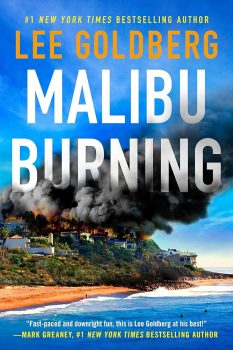 It came out in 2021, and a sequel, Isaac Steele and the Best Idea in the Universe, followed up in 2024. I’m gonna listen to that after I finish this first one.
It came out in 2021, and a sequel, Isaac Steele and the Best Idea in the Universe, followed up in 2024. I’m gonna listen to that after I finish this first one.
Also, I listened to Larry Correia’s three-book Lost Planet Homicide series. I don’t care how you feel about him, or David Eddings, or Josh Whedon (I’m re-watching Firefly right now: man, Fox messed up with that one), or Orson Scott Card, or Neil Gaiman, or whoever. We all make our own decisions on what we watch and read (and what Eddings did hung a bit over my re-read of The Belgariad, which I still love). And the Hugos matter not a whit in my life. If you are bothered I listened to Correia, just move along, or quit reading me, or whatever. Let’s be adults.
Lost Planet Homicide is the title of the first book of the series of the same name. It’s a hardboiled cop (detective) book set in space. It’s definitely tongue-in-cheek, and I get if some people think it’s too over-the-top. But it’s intended to be, and I think it’s more homage than parody.
A colony ship went off course and ended up a thousand light years from Earth. Croatan has five mountain peaks the rise above a fatal cloud of acid that blankets the world. This is not a fun place. Corporations and criminal syndicates call the shots. Murder can be bought off usually. When it can’t, DCI Lutero Cade is called in to…gasp…actually solve the crime! If you think Chandler’s Philip Marlowe and Bay City was cynical, welcome to Five Peaks.
The stakes are epic, and the stories link together, but also stand-alone. Oliver Wyman does hardboiled PI pretty well. Good choice.
I’m a fan of Isaac Asimov’s R. Daneel Olivaw books (I wrote about them here). So, while I don’t do much scifi (which relegates me to the kiddie table at Black Gate gatherings), I don’t mind scifi cop/PI stuff. Both of these were fun listens, with different vibes.
MALIBU BURNING – Lee GoldbergI’m a huge fan of Lee Goldberg’s Monk books. I’ve also listened to all but the most recent Eve Ronin novel, and that is a terrific buddy cop series, set in Hollywood. It occasionally borders on as dark as I get (for a hardboiled fan, I’m a little squeamish), but never goes too far. Can’t wait to get to the most recent one, Dream Town.
Anywhoo, book three of his Sharpe & Walker series is coming in April. Walter Sharpe is an arson investigator, and his new partner is former US marshal Andrew Walker. And this 2023 title about central CA on fire, certainly is timely.
Lee was a terrific screenwriter. Go look up his IMDB page. He and his writing partner William Rabkin penned a couple excellent episodes for A&E’s A Nero Wolfe Mystery. But now Lee is a regular tenant on the NY Times’ best-seller list. He writes fast-paced, absorbing thrillers and crime dramas. I haven’t even managed to get around to his hit series co-written with Janet Evanovich.
I think you could pick any of his series’ (and you can never go wrong with Monk!) and be glad you did. I’m a fan of pulpster Stewart Sterling (real-name, Prentice Winchell). Which includes his Fire Marshal Pedley books (NY Harbor cop Steve Kosko is also fine ‘unconventional’ hardboiled PI). So, a current series, about an arson investigator, written by a top flight novelist, is right up my alley. Definitely recommended.
A POINT OF LAW – John Maddox RobertsBook ten of thirteen in Roberts’ fantastic SPQR series of mysteries set in Ancient Rome. I’ve talked about them here. I absolutely love these stories, and John Lee is the perfect narrator. Click on the link for more info. I have not been disappointed with a single book so far, and I am spacing out the remaining three (Roberts died last year).
He was long working on the next book in the series. I hope they decide to find somebody of quality and have them finish it (Scott Oden?). But I’m really glad I discovered these, late to the party as I was. It sparked an interest in Ancient Rome stuff again. For example, I went and read Michael Kurland’s Roman mysteries short story collection.
ROMAN BLOOD – Steven Saylor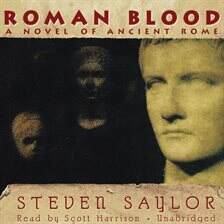 I have written about Saylor’s fictional recounting of the real-life Austin Servant Girl Annihilator. You read that, RIGHT? Saylor is best known for his Roma Sub Rosa mysteries set in…you guessed it, Ancient Rome!
I have written about Saylor’s fictional recounting of the real-life Austin Servant Girl Annihilator. You read that, RIGHT? Saylor is best known for his Roma Sub Rosa mysteries set in…you guessed it, Ancient Rome!
With the Roberts audiobooks fanning the flames; and having read Kurland’s stories: I was ready for more. Saylor was a no brainer.
He has written over a dozen books featuring Gordianus the Finder. Now, he ‘went back’ and wrote a prequel trilogy. I tried to start the first one, The Seven Wonders. Stephen Plunkett was unlistenable. It felt like he was trying to read the entire thing in a monotone. I had to quit.
However, I still wanted to give Saylor a try, so I got the first ‘proper’ Gordianus book, Roman Blood. Scott Harrison was much better as a narrator. I completed it and immediately moved on to Arms of Nemesis.
I like Gordianus. He’s not a public office holder doing official investigations, like Decius Caeceillius Metellus the younger. Gordianus is essentially a private eye. His bartering to get a bigger fee early in book two was amusing. As with most private eyes, he finds himself in peril more than once. And he ruffles important feathers.
I like the authenticity of the Roman world in Saylor’s and Roberts’ books. It really creates a vivid background. And while I love my Hammett and Nebel, the ancient world setting is pretty cool. Roman Blood taker place in 80 AD, in Rome.
I definitely recommend checking out Saylor, and Roberts, if this kind of thing appeals to you.
THE TROJAN WAR: A NEW HISTORY – Barry StraussSo, last week’s post was all about my life-long love of the Trojan War. Which is rooted in the Iliad. I listened to this non-fiction book on the topic, which got me fired up to write last week’s entry. This was a g
I am not really interested in the spate of Trojan War novels (especially the romance ones. Ugh). Though I mentioned last week, being a huge Rex Stout fan, I like The Great Legend. I’ve long intended to read some David Gemmell, and his trilogy of Trojan War novels seems like a no-brainer for that.
But I’m into the original myth, and the study of the war, and the real-life history around it.
Been awhile since I did a non-fiction book. I learned some things. It mixed content from The Iliad, with information related to it. I learned about battering rams (apparently the real ones weren’t like Grond…), sea power, the Greek city-states: just lots of interesting info. And, I always like hearing about Iliad stuff.
This was a good listen, letting me revisit the Trojan War. Sitting and reading this would have been more difficult, for a couple reasons. But the audiobook totally worked.
What I’ve Been Listening To: November, 2024
What I’ve Been Listening To: Sepetember, 2024
What I’ve Been Listening To: August, 2024
What I’ve Been Listening To: July, 2024
What I’ve Been Listening To: September 2022
May I Read You This Book?

Bob Byrne’s ‘A (Black) Gat in the Hand’ made its Black Gate debut in 2018 and has returned every summer since.
His ‘The Public Life of Sherlock Holmes’ column ran every Monday morning at Black Gate from March, 2014 through March, 2017. And he irregularly posts on Rex Stout’s gargantuan detective in ‘Nero Wolfe’s Brownstone.’ He is a member of the Praed Street Irregulars, founded www.SolarPons.com (the only website dedicated to the ‘Sherlock Holmes of Praed Street’).
He organized Black Gate’s award-nominated ‘Discovering Robert E. Howard’ series, as well as the award-winning ‘Hither Came Conan’ series. Which is now part of THE Definitive guide to Conan. He also organized 2023’s ‘Talking Tolkien.’
He has contributed stories to The MX Book of New Sherlock Holmes Stories — Parts III, IV, V, VI, XXI, and XXXIII.
He has written introductions for Steeger Books, and appeared in several magazines, including Black Mask, Sherlock Holmes Mystery Magazine, The Strand Magazine, and Sherlock Magazine.
Review: Tideborn by Eliza Chan
 Buy Tideborn
OFFICIAL AUTHOR BIO: Eliza Chan is a Scottish–born Chinese–diaspora author who “writes about East Asian mythology, British folklore and reclaiming the dragon lady, but preferably all three at once”. Eliza’s work has been published in The Dark, Podcastle, Fantasy Magazine and The Best of British Fantasy, and her non-fiction has appeared on Tor.com. She lives in the north of England with her partner and young child.
Buy Tideborn
OFFICIAL AUTHOR BIO: Eliza Chan is a Scottish–born Chinese–diaspora author who “writes about East Asian mythology, British folklore and reclaiming the dragon lady, but preferably all three at once”. Eliza’s work has been published in The Dark, Podcastle, Fantasy Magazine and The Best of British Fantasy, and her non-fiction has appeared on Tor.com. She lives in the north of England with her partner and young child.FORMAT/INFO: Tideborn will publish on March 25th, 2024 from Orbit Books. It is 384 pages long and will be published in hardcover, ebook, and audiobook formats
OVERVIEW/ANALYSIS: A selfless act may have saved the citizens of Tiankawi, but the city is not out of danger yet. A deadly force is heading towards the city, and this time, it may be unstoppable. Nami the water dragon must lead an expedition out into the open ocean in an attempt to stop the disaster before it's too late. But dangers lurk within the city as well. Tensions between fathomfolk and humans are even worse than before. If Mira the half-siren doesn't find a way to unite the people, the city may tear itself apart from within before any outside force can destroy it.
Tideborn is a bit of a muddled mess as it tries to make sense of a city crippled by prejudice as an impending disaster approaches. Smartly, the magic that saved the city from destruction at the end of Fathomfolk did not also magically solve racism overnight; if anything it made it worse, causing even more fracturing in a populace grappling with dramatic change. But now nearly all of the protagonists' victories are tied to solving racism in some way, and they have to do it in the space of one book.
The author has mixed success in portraying effective resolution of these tensions. Ironically, Nami the water dragon's storyline, which I was less interested in overall, has perhaps the most realistic storyline. She is sent on a mission on a boat with roughly a dozen other people, both human and fathomfolk. Within this microcosm is a range of prejudices and acceptance; in order to achieve her mission, Nami has to find a way to get her crew to set aside their fears and prejudices about each other, while also dealing with her own insecurities. It's not an easy task, but winning the hearts and minds of a handful of people is much easier than that of a whole city.
The rest of the characters are left to deal with the political turmoil in Tiankawi, and this happens less effectively. On the one hand, this makes sense. You can't make the population of an entire city set aside their individual fears and hatreds with the snap of your fingers. But that also means that it's hard to get a satisfying sense of victory. Mira and her allies can triumph over some figureheads, but they really haven't solved the root of the problem by the end of the story. It leads to a somewhat messy finale as none of these internal problems are really resolved, even if the biggest threat was eliminated.
The lack of a cohesive end goal is, at the end of the day, what causes this story to feel a bit scattered. Nami has a clear goal in her mission, but Mira's is a bit more nebulous. She is basically simply trying to hold the city together long enough for either Nami to succeed or for the city to be destroyed. The result is Mira is dealing with several different forces trying to undercut both her and any attempts at peace, leaving her fighting enemies off on all sides. Cordelia the sea-witch, on the other hand, has an even less clear goal, turning her aims this way and that in pursuit of her personal whims.
(And yes, Nami's toxic boyfriend is still around, and yes, you will still want to drop kick him into the sun.)
CONCLUSION: It's hard to sum up my final thoughts on Tideborn. On the one hand, I really appreciate the themes the author is grappling with. But because these themes don't have an easy answer, there's no clear resolution at the end of the day. Yes, some villains are thwarted, but as the story shows, that doesn't dissolve the beliefs of their followers. While I do enjoy the world the author created and the characters that inhabit it, the city at the heart of Tideborn is perhaps too realistically riddled with prejudice for the duology to have a satisfying resolution.
Comment on Worldbuilding Articles: Reader Poll (2025 Edition) by Allan
1. Branch Affinities
2. Essentia Capacity
3. The Board
4. Sigi Recycling
Just a Few More Hours…
…to get my upcoming class, “Craft in the 21st Century,” for the early bird price. Right now, it’s $200. After it goes live tomorrow, it’ll be $250. Hurry on over if you want to refresh your writing for the 2020s. Click here to get more information and order the class.
We’re also offering some coaching on publishing your work.
We’ve been conducting a writer’s block course, and in the webinar, we learned that one thing which actually blocks writers in 2025 is the learning curve for indie publishing. People get stuck at various different places, so we can’t just do a simple do-this, do-that course anymore. (It was possible ten years ago; isn’t possible now)
So Dean wants to help as many folks as he can. But he can only do it one at a time. Therefore, for 3 months, he’ll help a few people get started from wherever they’re stalled. Then, if that works, he’ll do it again for a different group.
If you’re interested, check out this post: https://deanwesleysmith.com/coaching-getting-your-stuff-out/
Alternate Londons, the Future of Lotteries, and Colony Ships: January-February Print Magazines
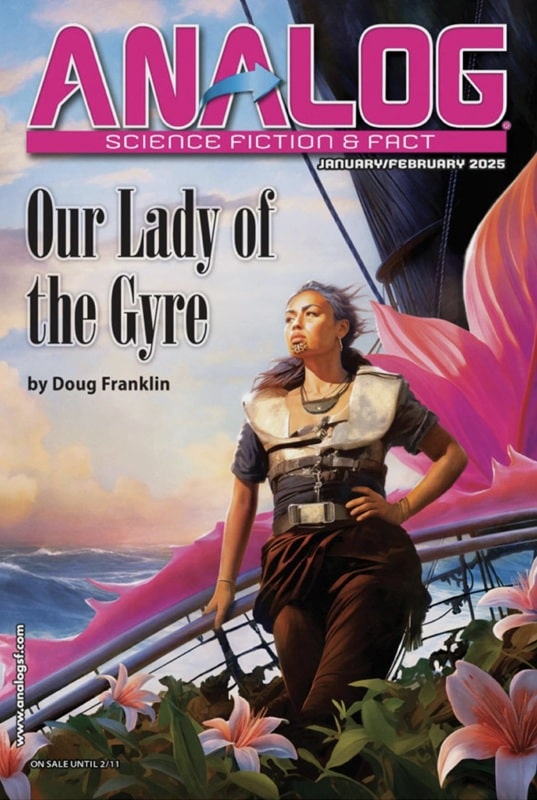
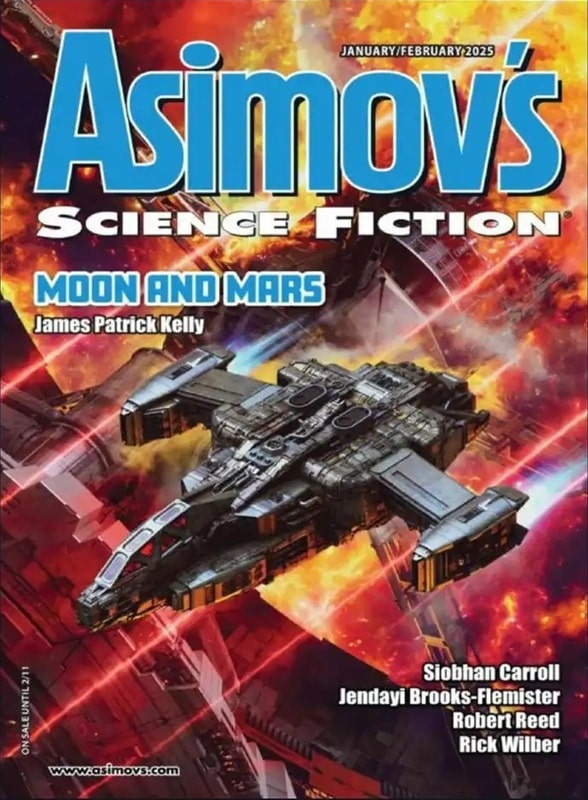
January-February 2025 issues of Analog Science Fiction & Fact and Asimov’s Science
Fiction. Cover art by Tomislav Tikulin (for “Our Lady of the Gyre”) and Shutterstock
Still no sign of the next issue of The Magazine of Fantasy & Science Fiction, which is disheartening. That leaves us with only two issues published last year (Winter 2024 and Summer 2024), and no hint when the next one might arrive. I’m hearing rumors that the magazine has been sold, but I’ve been unable to confirm that, so for now it’s just gossip.
But we’ve got issues of Asimov’s Science Fiction and Analog Science Fiction & Fact in hand, and they’re just as enticing as usual, with contributions from John Shirley, Sean McMullen, Mark W. Teidemann, Steve Rasnic Tem, Paul Di Filippo, Sakinah Hofler, James Van Pelt, James Patrick Kelly, Siobhan Carroll, Robert Reed, Faith Merino, Matthew Kressel, Rick Wilber, Jane Yolen, Kendall Evans, and many more.
The issues contain a new Great Ship tale by Robert Reed, a new Unsettled Worlds story by Siobhan Carroll (which Sam Tomaino calls a “suspenseful, exciting tale”), a new novelette “Rejuve Blues” from John Shirley (which Victoria Silverwolf labels “a suspenseful crime story and psychological study”), and the last installment in James Patrick Kelly’s trio of stories about Marishka Volochkova, “Moon and Mars,” which Sam proclaims is “probably another Nebula nominee.”
Victoria Silverwolf at Tangent Online enjoyed in the latest Analog.
“Our Lady of the Gyre” by Doug Franklin mostly takes place aboard a sea vessel that fights excess carbon dioxide in the atmosphere via bioengineered diatoms. The protagonist, who communicates with an artificial intelligence orbiting the Earth, takes two young people on his ship and faces a dangerous storm… a very dense work of fiction that requires careful reading. At first, it is difficult to tell what’s happening or what this future world is like, but patient readers will be rewarded with a vivid and imaginative tale with appealing characters.
The novelette “Rejuve Blues” by John Shirley features an elderly couple who win a lottery that offers them the chance to be young again. The man runs into trouble with criminals, while the woman, thinking he has left her, returns to her former activity as a fighter against the Taliban. The author creates a complex and convincing future that is neither utopian nor dystopian… a suspenseful crime story and psychological study.
The main character in “Go Your Own Way” by Chris Barnham accidentally discovers a way to travel into alternate versions of London, some very similar to the familiar one and others wildly different. He falls in love in one of these parallel worlds, but the arrival of an alternate version of himself causes complications. The plot is that of the eternal triangle, in which two of the people involved are the same person. (One might call it an isosceles triangle.) The various parallel Londons are described only briefly, and are far more interesting than the love story…
In the novelette “Prince of Spirals” by Sean McMullen, conspirators kidnap a forensic anthropologist and force him to study samples from the skeletons of two bodies thought to be the so-called Princes in the Tower, heirs to King Edward IV of England… The motive is to determine if either Prince survived to have descendants, giving members of the conspiracy a claim to the throne… This is a suspenseful crime story, with intriguing speculative technology and an interesting look at the techniques used by forensic anthropologists.
At first, “Quest of the Sette Comuni” by Paul Di Filippo seems like pure fantasy, as a female satyr and a golem set out to rescue a princess from a wizard, in order to free their master from his imprisonment by a sea-dwelling queen. It soon becomes clear that the golem is actually a machine and the other characters are the result of advanced biotechnology. The setting is richly imagined, from an underwater Venice inhabited by amphibious humans to an antagonist who has made himself resemble the Jabberwock from Lewis Carroll’s famous nonsense poem. Although not a comedy, the story has sufficient amount of subtle wit to draw the reader into its colorful world.
The magazine concludes with the novella “Apartment Wars” by Vera Brook. The setting is Poland in 1979. The widow of a scientist faces the possibility that she will be forced out of her relatively large apartment by the government because she lives alone. She expects her daughter and son-in-law to arrive soon as permanent guests, justifying her need for the place, but time is running out. Meanwhile, the abusive boyfriend of a neighbor threatens to expose her situation to the authorities… The situation takes a dramatic turn when the widow discovers an extraordinary device built by her husband.
Read Victoria’s complete review here.
The new Asimov’s is thoughtfully reviewed by Mina at Tangent Online. Here’s a sample.
“In the Splinterlands the Crows Fly Blind” by Siobhan Carroll takes patience to read. The world building is complex and initially confusing. The protagonist, Charlie, sets off to find his missing brother, Gabe, as well as Gabe’s girlfriend. There are some groovy invented words like Universe-shard, atmotech, Crowmind, Crowdogs and Vestigium — along with words from what seems to be a Cree dialect — they do eventually all make sense. Charlie finds himself a hero as he saves his fragment of world from destruction by the carelessness of “some rich guy stepping on butterflies.” Worth persisting.
“Five Hundred KPH Toward Heaven” by Matthew Kressel is set just after the heyday of lifts into space, reminiscent of train travel. They are being replaced by much faster, cheaper ships. In a final ascent party, Terese reminisces with other lift pilots and ponders on what is being lost — a sense of wonder and a sense of connection — “sometimes there’s benefits to going slow.”
“Shadow of Shadows” by Frank Ward is a pleasure to read because, once you reach the end, the title hits you with its full poignancy. This reader appreciates when an author does this so well. A washed-up research physicist stands at the threshold of finally finding proof for his theory of a “Many Worlds Interpretation.” The proof of alternate universes is, however, not without pain. A tale that explores not just quantum theory but also its emotional repercussions. I would read this twice.
The tension build-up in “What the Frog’s Eye Tells the Frog’s Brain” by Beston Barnett is incredible. One can only say: bravo! In this story, a desperate scientist, being interrogated and tortured by an AI courageously sets out to trick it into shutting down. The references to Linux, Hexspeak and ASCII are very satisfying for this linguist, for AI does indeed have its own language.
“My Biggest Fan” by Faith Merino is a creepy and ultimately sad tale. The narrator grows up seeing the same woman and hearing the same tune at regular intervals; but she is always a different age. She leaves him notes signed “your biggest fan.” When he finally understands why their trajectories keep overlapping, it’s tool late: they have become each other’s hell, as Sartre would say. Quantum particles meet stalker meet Greek tragedy.
In “Moon and Mars” by James Patrick Kelly, Moon-settler Mariska is part of the crew on the Natividad, a colonists’ ship she has joined to be with her Martian boyfriend, Elan. It soon becomes apparent that those with vested interests in the anti-matter that will power the ship through a wormhole to the Destination planet on the other side are trying to stop the mission. Mariska, her mother and Elan are all part of a group determined to take off early before the mission can be stopped. The race against time is gripping…. A great read.
Read Mina’s full review here.
Here’s all the details on the latest SF print mags.
[Click the images for bigger versions.]
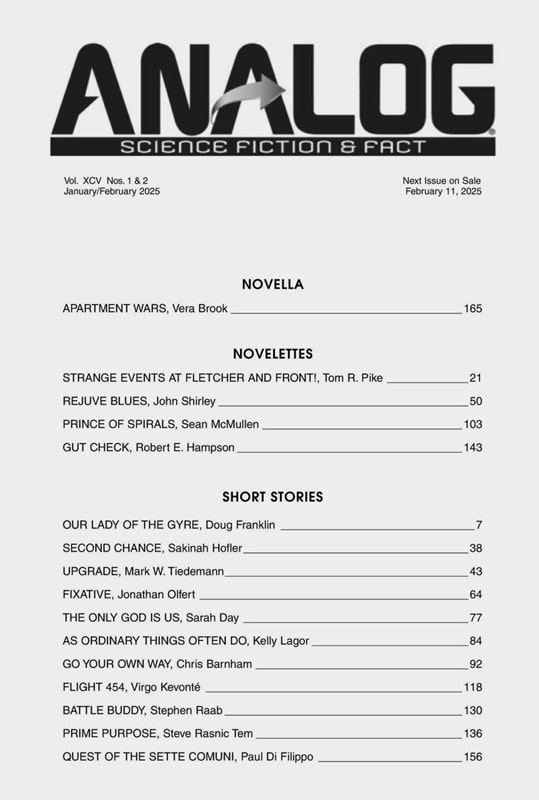
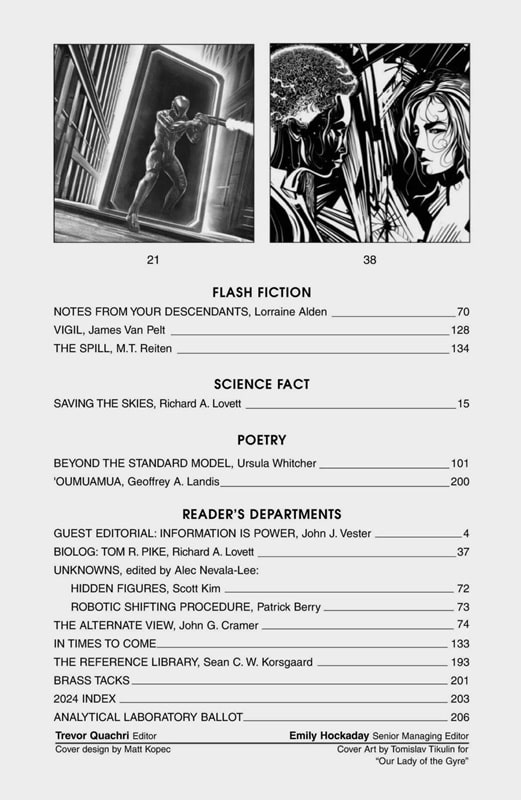
Contents of the January-February 2025 issue of Analog Science Fiction
Editor Trevor Quachri gives us a tantalizing summary of the current issue online, as usual. Sadly, I didn’t think to grab a copy before the latest issues dropped. Next time.
Here’s the full TOC.
Novella
“Apartment Wars” by Vera Brook
Novelettes
“Strange Events at Fletcher and Front!” by Tom R. Pike
“Rejuve Blues” by John Shirley
“Prince of Spirals” by Sean McMullen
“Gut Check” by Robert E. Hampson
Short Stories
“Our Lady of the Gyre” by Doug Franklin
“Second Chance” by Sakinah Hofler
“Upgrade” by Mark W. Teidemann
“Fixative” by Jonathan Olfert
“The Only God is Us” by Sarah Day
“As Ordinary Things Often Do” by Kelly Lagor
“Go Your Own Way” by Chris Barnham
“Flight 454” by Virgo Kevonté
“Battle Buddy” by Stephen Raab
“Prime Purpose” by Steve Rasnic Tem
“Quest of the Sette Comuni” by Paul Di Filippo
Flash Fiction
“Notes From Your Descendants” by Lorraine Alden
“Vigil” by James Van Pelt
“The Spill” by M.T. Reiten
Science Fact
Saving the Skies: How One Small City in Arizona is Pointing the Way to a Better (Darker) Way, by Richard A. Lovett
Poetry
Beyond the Standard Model by Ursula Whitcher
‘Oumuamua by Geoffrey A. Landis
Reader’s Departments
Guest Editorial: Information is Power by John J. Vester
Biolog: Tom R. Pike by Richard A. Lovett
Unknowns, edited by Alec Nevala-Lee:
Hidden Figures by Scott Kim
Robotic Shifting Procedure by Patrick Berry
The Alternate View by John G. Cramer
In Times to Come
The Reference Library by Sean C.W. Korsgaard
Brass Tacks
2024 Index
Upcoming Events by Anthony Lewis
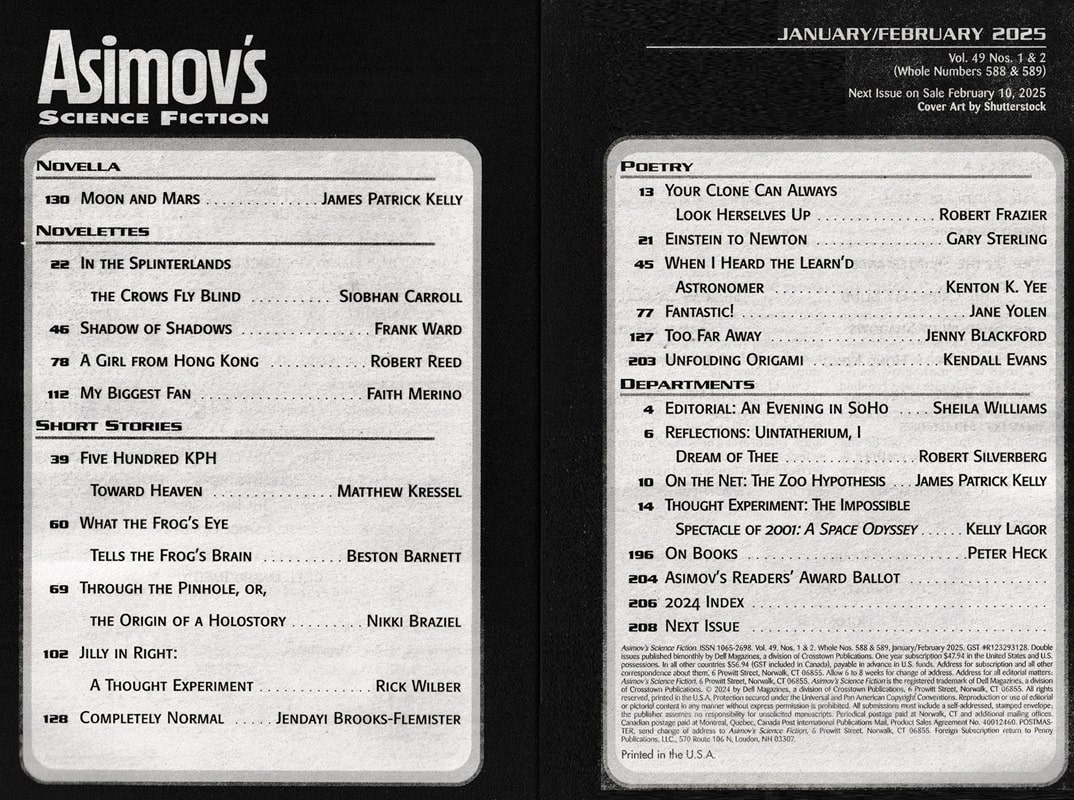 Contents of the January-February 2025 issue of Asimov’s Science Fiction
Asimov’s Science Fiction
Contents of the January-February 2025 issue of Asimov’s Science Fiction
Asimov’s Science Fiction
Sheila Williams provides a handy summary of the latest issue of Asimov’s at the website. But I missed it this month. Next time I’ll remember before it’s gone.
Here’s the complete Table of Contents.
Novella
“Moon and Mars” by James Patrick Kelly
Novelettes
“In the Splinterlands, the Crows Fly Blind” by Siobhan Carroll
“Shadow of Shadows” by Frank Ward
“A Girl from Hong Kong” by Robert Reed
“My Biggest Fan” by Faith Merino
Short Stories
“Five Hundred KPH Toward Heaven” by Matthew Kressel
“What the Frog’s Eye Tells the Frog’s Brain” by Beston Barnett
“Through the Pinhole, Or, the Origin of a Holostory” by Nikki Braziel
“Jilly in Right: A Thought Experiment” by Rick Wilber
“Completely Normal” by Jendayi Brooks-Flemister
Poetry
Your Clone Can Always Look Herselves Up by Robert Frazier
Einstein to Newton by Gary Sterling
When I Heard the Learn’d Astronomer by Kenton K. Yee
Fantastic! by Jane Yolen
Too Far Away by Jenny Blackford
Unfolding Origami by Kendall Evans
Departments
Editorial: An Evening in SoHo by Sheila Williams
Reflections: Uintatherium, I Dream of Thee by Robert Silverberg
On the Net: The Zoo Hypothesis by James Patrick Kelly
Thought Experiment: The Impossible Spectacle of 2001: A Space Odyssey by Kelly Lagor
On Books by Peter Heck
Asimov’s Readers’ Award Ballot
2024 Index
Next Issue
Analog, Asimov’s Science Fiction and The Magazine of Fantasy & Science Fiction are available wherever magazines are sold, and at various online outlets. Buy single issues and subscriptions at the links below.
Asimov’s Science Fiction (208 pages, $8.99 per issue, one year sub $47.97 in the US) — edited by Sheila Williams
Analog Science Fiction and Fact (208 pages, $8.99 per issue, one year sub $47.97 in the US) — edited by Trevor Quachri
The Magazine of Fantasy & Science Fiction (256 pages, $10.99 per issue, one year sub $65.94 in the US) — edited by Sheree Renée Thomas
The January-February issues of Asimov’s and Analog were on sale until February 11. See our coverage of the November-December issues here, and all our recent magazine coverage here.
Comment on Worldbuilding Articles: Reader Poll (2025 Edition) by Randall
Truly looking forward to the third book. In the meantime, the three below are my favored topics of coverage.
1.) Branch Affinities
2.) Sigl Recycling
3.) The Board
While there are others I want to include mentioned by others in the comments, I feel those may be plot points meant to be explored as the books reveal them.
Comment on Worldbuilding Articles: Reader Poll (2025 Edition) by Dawn
Sigl fashion
Attunement
Essentia Capacity
Comment on THE CHAIN OF EYES – Tainted Cabal book 2 – news by Marcus
Dead series?
Comment on Worldbuilding Articles: Reader Poll (2025 Edition) by Justin Gasal
Sigle Recycling
Attunement
Sigle Fashion
Comment on Worldbuilding Articles: Reader Poll (2025 Edition) by Jim Sackman
I am most interested first in closing out knowledge of essentia and sigils.
After that, the structure of the drucrafting world more broadly.
So my order would be:
1 – Essentia Capacity
2 – Attunement
3 – Branch Affinities
4 – Sigl Recycling
5 – Country Affinities
6 – The Board
7 – Corporations
What a Croc, Part III
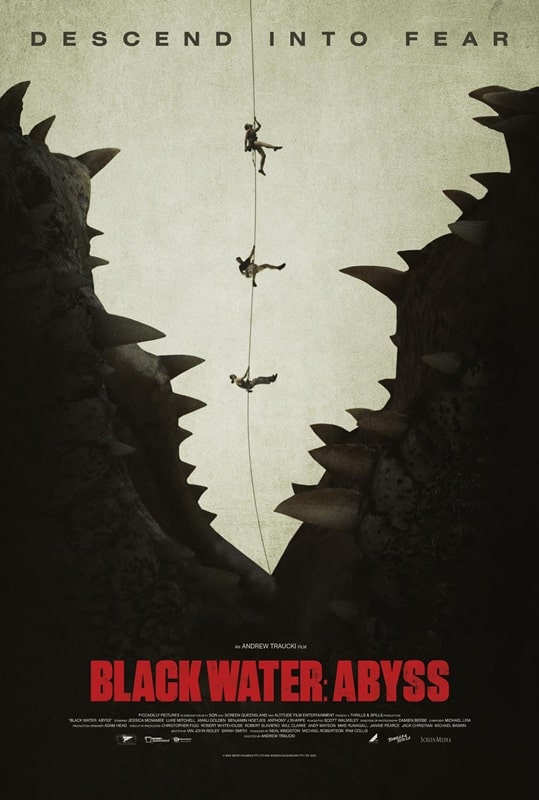 Black Water: Abyss (Altitude Film Entertainment, July 10, 2020)
Black Water: Abyss (Altitude Film Entertainment, July 10, 2020)
My next watch-a-thon is a favorite genre: crocs and gators. Unfortunately, this means the pickings are a bit slim, as I’ve already seen most of them, but I’ve managed to dig up 15 so far (supplemented with a Gila Monster and a couple of Komodos), and I’m sure the intended list of 20 will materialize as streaming services start suggesting titles.
What a Croc #14: Black Water: Abyss (2020) CrackleCroc or gator? Crocodile!
Real or faker? Some pretty great CG.
Any good? I do like me an Aussie croc flick, and this is one of them. The premise is simple: stick some folks in a cave, flood it, trap them, let loose a big croc. The spaces are tight, the tension is taut, and the croc has the good sense to eat the cast in order of character development.*
There’s a bit of relationship drama in the mix between meals, but at the end of the day it’s just a murky cocktail of Rogue and The Decent, but doesn’t come close to being as good as either. Still, I didn’t hate it, and it was well produced, so I’ll grade it a little higher.
7/10
*Now where have I seen that poster design before…?


Lake Placid: The Final Chapter (Syfy, September 29, 2012) and Rollergator (RiffTrax, 1996)
Croc or gator? Alligator(s)!
Real or faker? All terrible CG.
Any good? I still have fond memories of the first time I watched Lake Placid — I was totally unprepared for the all round brilliance of it, from the writing and the cast to the effects and direction. Sadly, each successive sequel has been horrendous, and this one, the incorrectly named ‘Final Chapter’ is the penultimate nail in the coffin.*
As you can tell from the ‘quality’ poster, the story is trite, the characters uninteresting and the effects garbage — the only redeeming features might be Robert England (hamming it up in another gator flick), and Yancy Butler (wasted here as she reprises her role as a two-pack-a-day-voiced rogue ranger). The most egregious aspect of this one though, is the directing and editing. There’s only one director who can get away with that many crash zooms, and his name is Sam Raimi.
Raimi did not direct this.
4/10
*I just discovered there are actually TWO more Lake Placid films after this one. Not that it makes this any easier.
What a Croc #16: Rollergator (1996) TubiCroc or gator? Gator. Small. Purple.
Real or faker? A hand puppet.
Any good? I tried to find the original version of this, but had to settle for the Rifftrax version. Shocking admission: I don’t find Rifftrax particularly funny (not a huge fan of MST3K either) and they just paved the way for stuff like CinemaSins and every other armchair critic who thinks they’re funny. I am fully aware of the staggering hypocrisy of this statement, but there you go.
Anyway, in this film a roller skating woman meets a small, jive talking gator and tries to get him out of the carnival and back to the swamp. Presumably written by a third-grader, it’s utter crap. Not even funny or surreal enough to be a guilty pleasure — just a miserable, miserable slog.
1/10
 Mega Shark vs. Crocosaurus (The Asylum, December 21, 2010)
What a Croc #17: Mega Shark vs. Crocosaurus (2010) YouTube
Mega Shark vs. Crocosaurus (The Asylum, December 21, 2010)
What a Croc #17: Mega Shark vs. Crocosaurus (2010) YouTube
Croc or gator? Croc. Osaurus.
Real or faker? Rubbish CG.
Any good? You know what the answer is going to be, so let’s just cut to the chase. Robert Picardo is a fine actor, he voiced the male, culturally-obsessed alien in Joe Dante’s Explorers and I love him for that. He’s also good in everything else, but I guess he needed a new deck, because he’s in this.
Gary Stretch is also in this. British boxing fans may remember the name, the rest of you will just know him as a punching bag-faced enigma with the looks of a leading man and the mystery of a Swiffer. Sarah Lieving stars opposite him as a potentially badass special investigator who is relegated to scowling boobily at the rest of the cast while flying a pretend helicopter.
The story is rote, the direction and editing are dull and the effects are tragic. The titular creatures (especially the giant croc) are rendered in spectacular blur-o-vision, unhindered by weight or physics. I feel neither joy nor despair at having watched this film, I’m just languishing in a limbo populated by cookie cutters, tight vests and pixels.
4/10


Croczilla (Beijing Enlight Pictures, 2012) and Crocodile (Lions Gate, August 26, 2000)
Croc or gator? Crocodile. Big boi.
Real or faker? Fairly decent CG (in parts).
Any good? I started watching this one quite early on in the watch-a-thon, and thought it had promise, so saved it to end on a high note. It is indeed fun, however, I would sorely love to see a subtitled version, as the English dubbing on this Chinese movie is horrendous.
Promoted as China’s ‘first monster movie’, a claim that has been made on several of the films I’ve watched from China, Croczilla is meant to be a tongue-in-cheek flick. For this reason, the actors ham it up to the level of cartoon characters, and the English V.O. artists were apparently told to do the same, because the dubbing is ear-splittingly intolerable, especially the voice of Barbie Hsu’s character, which threatened to shatter every window in the house.
Aside from the audio hell, it’s a jolly romp, with a 36 ft croc on the rampage in Hangzhou, its belly full of Yuan (about a million worth, or 100,000 Euros as the shrill dubbing informs us). The cast is likeable (although the gangsters are a trifle over the top), and the croc itself is a nice bit of CG. It’s a great model, and for the most part animated well, but some of the interactions with its environment weren’t great. Overall, I enjoyed it, and that’s what matters, so there.
7/10
What a Croc #19: Crocodile (2000) CrackleCroc or gator? Crocodile.
Real or faker? Some OK animatronics and rubbish CG.
Any good? Apparently, when I said Eaten Alive was the only Tobe Hooper film I hadn’t seen, I had forgotten about this one — and I wish it had remained forgotten. I was initially excited when I saw Hooper’s name, doubly so when I saw the effects were done by Nicotero and Berger, but it seems there was no budget for effects and Hooper couldn’t give two shits about the film.
Nobody brings anything fresh to the production, it’s the same tired old story of unlikeable frat kids getting drunk and horny in a swamp, and the only reason to watch is to see how they get dispatched. Unfortunately, save for a couple of fun shots of folks sliding down a gullet, it’s all a bit ham-fisted, and the CG croc suffers from the same weightlessness as all the other low-budget beasts of the era. A shame.
5/10
 Crocodile 2: Death Swamp (Nu Image Films, August 1, 2002)
What a Croc #20: Crocodile 2: Death Swamp (2002) Crackle
Crocodile 2: Death Swamp (Nu Image Films, August 1, 2002)
What a Croc #20: Crocodile 2: Death Swamp (2002) Crackle
Croc or gator? Crocodile. Again.
Real or faker? Some pretty great animatronics.
Any good? Hot on the heels of the disappointment of Crocodile comes Crocodile 2, which chose to ignore sequel conventions and be titled Crocodiles. Also surprisingly, it is that rare breed, the superior sequel, and I had a lot of fun with it.
No hackneyed ‘hot kids in a swamp’ plot, this one is full of bank robberies, plane crashes and helicopter hijinks. The bad guys are extremely potty-mouthed and awful enough to cheer when they get eaten, and the plucky protagonists put up a fair fight. The effects are actually pretty gruesome, and the croc itself is one of the better ones I’ve seen. Good heavens, I do believe I’ve ended on a high note!
8/10
That’s the crocs and gators done. Next up, werewolves!
Previous Murkey Movie surveys from Neil Baker include:
What a Croc, Part I
What a Croc, Part II
Prehistrionics
Jumping the Shark
Alien Overlords
Biggus Footus
I Like Big Bugs and I Cannot Lie
The Weird, Weird West
Warrior Women Watch-a-thon
Neil Baker’s last article for us was What a Croc, Part II. Neil spends his days watching dodgy movies, most of them terrible, in the hope that you might be inspired to watch them too. He is often asked why he doesn’t watch ‘proper’ films, and he honestly doesn’t have a good answer. He is an author, illustrator, outdoor educator and owner of April Moon Books (AprilMoonBooks.com).

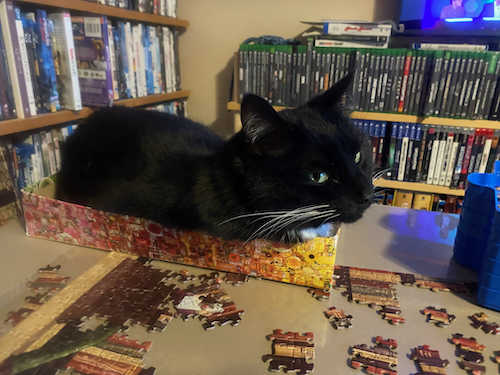


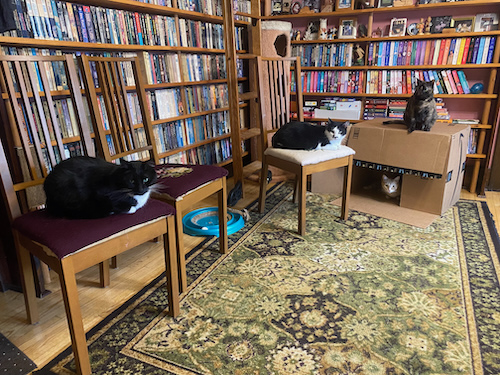
Recent comments